DevOps Patterns & Antipatterns for Continuous Software Updates
A presentation at Triangle DevOps Meetup August 2019 in in Morrisville, NC, USA by Baruch Sadogursky

DevOps Patterns & Antipatterns for Continuous Software Updates “What can possibly go wrong?!”

Why software updates? @jbaruch #TriangleDevOps #LiquidSoftware http://jfrog.com/shownotes



@jbaruch #TriangleDevOps #LiquidSoftware http://jfrog.com/shownotes
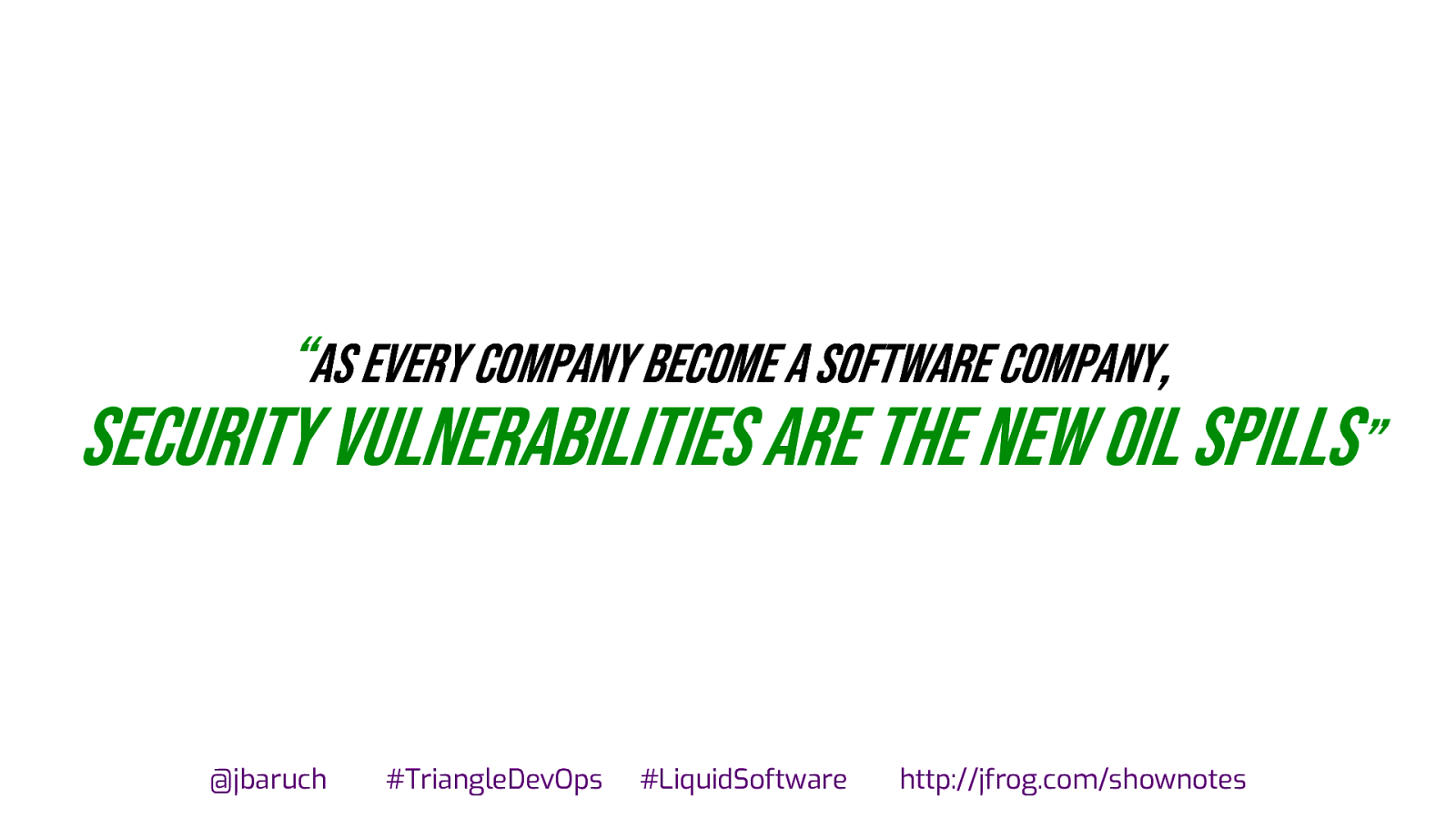
“As every company become a software company, Security vulnerabilities are the new oil spills” @jbaruch #TriangleDevOps #LiquidSoftware http://jfrog.com/shownotes

@jbaruch #TriangleDevOps #LiquidSoftware http://jfrog.com/shownotes

@jbaruch #TriangleDevOps #LiquidSoftware http://jfrog.com/shownotes




@jbaruch #TriangleDevOps #LiquidSoftware http://jfrog.com/shownotes


🎩 @jbaruch #dockercon jfrog.com/shownotes @ErinMeyerINSEAD’s “Culture Map”

shownotes http://jfrog.com/shownotes Slides Video Links Comments, Ratings Raffle @jbaruch #TriangleDevOps #LiquidSoftware http://jfrog.com/shownotes
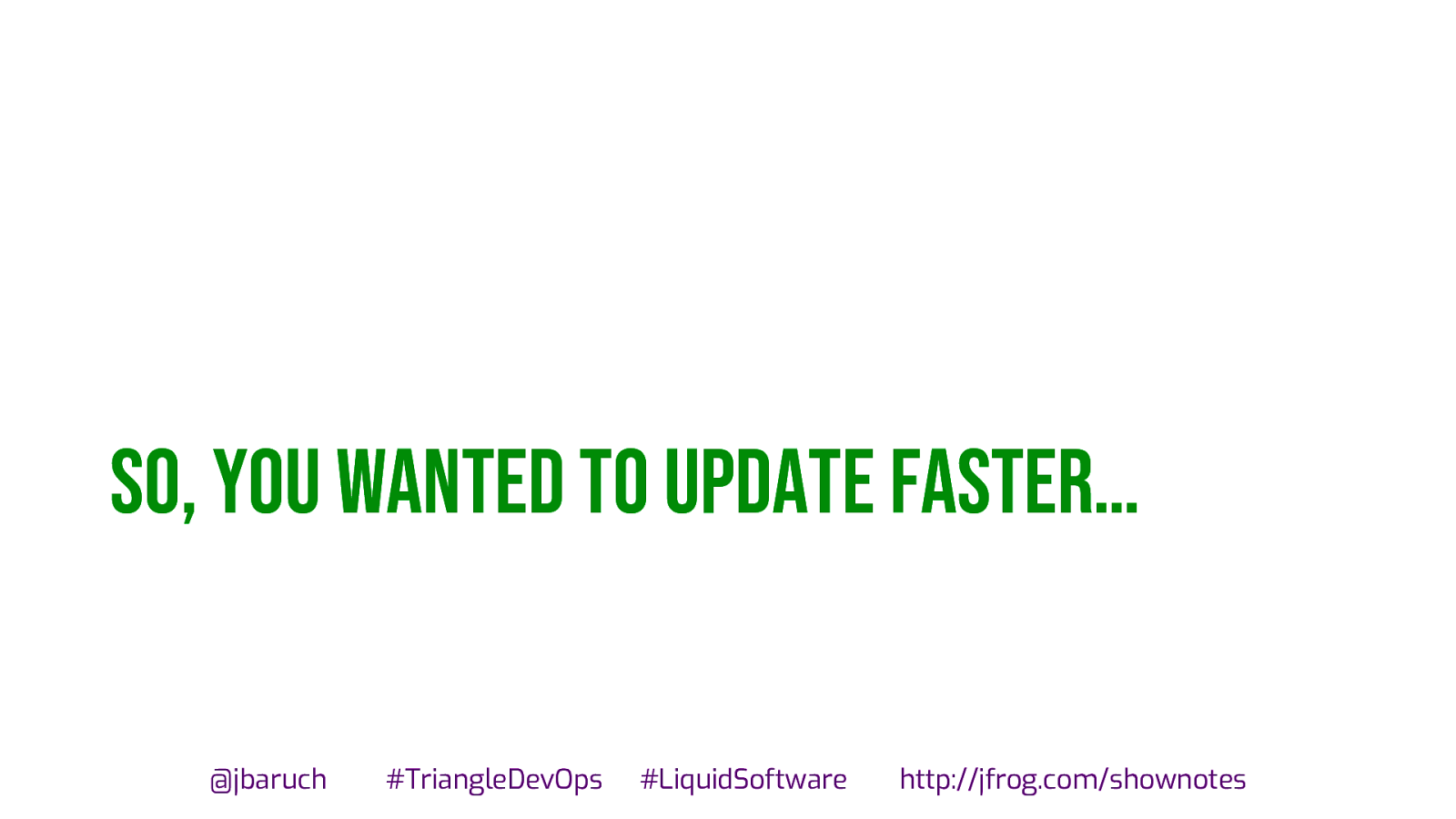
So, you wanted to update faster… @jbaruch #TriangleDevOps #LiquidSoftware http://jfrog.com/shownotes

@jbaruch #TriangleDevOps #LiquidSoftware http://jfrog.com/shownotes

@jbaruch #TriangleDevOps #LiquidSoftware http://jfrog.com/shownotes


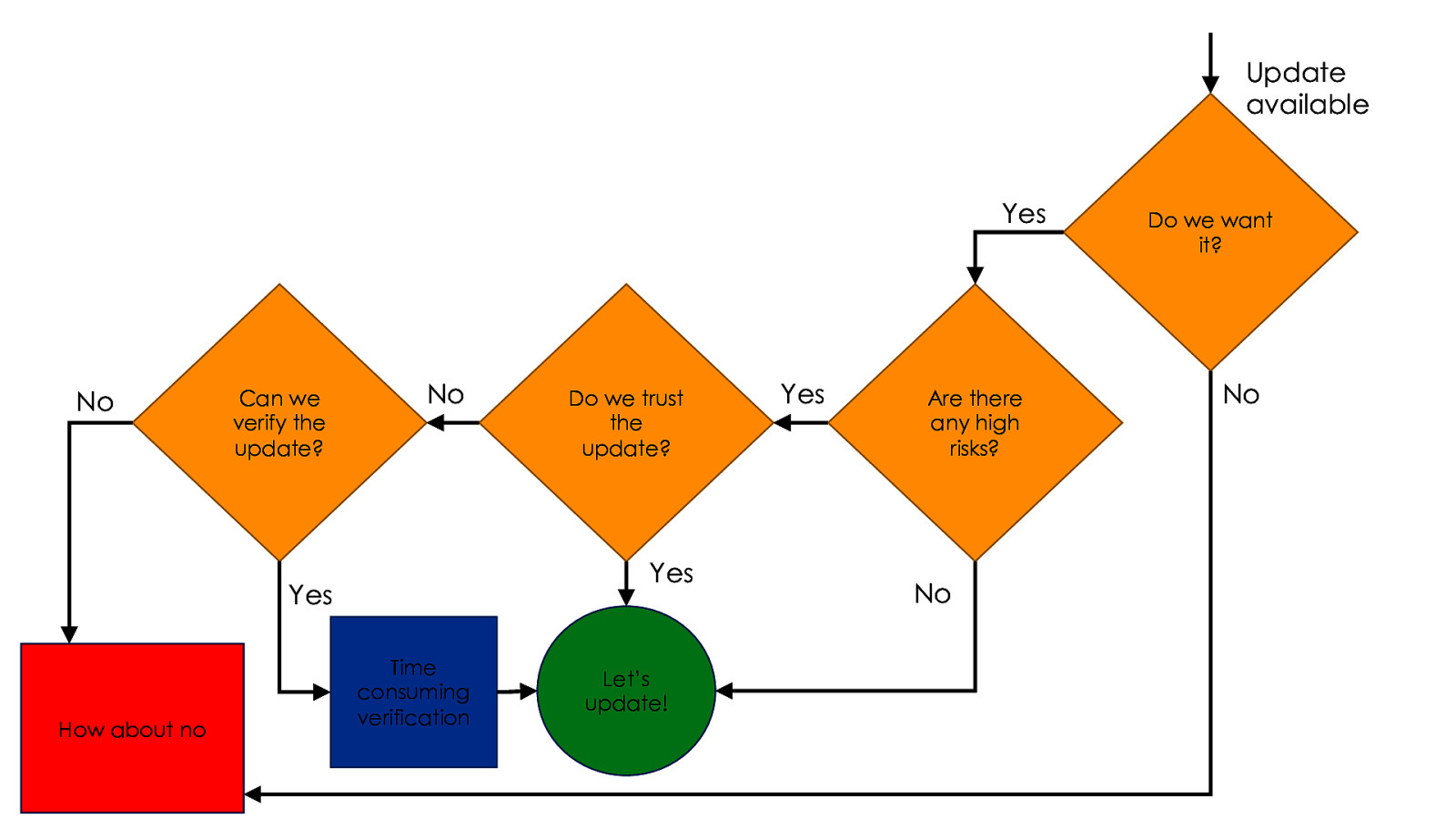
Update available Yes No Can we verify the update? No Yes Yes How about no Do we trust the update? Time consuming verification Let’s update! Yes Are there any high risks? No Do we want it? No

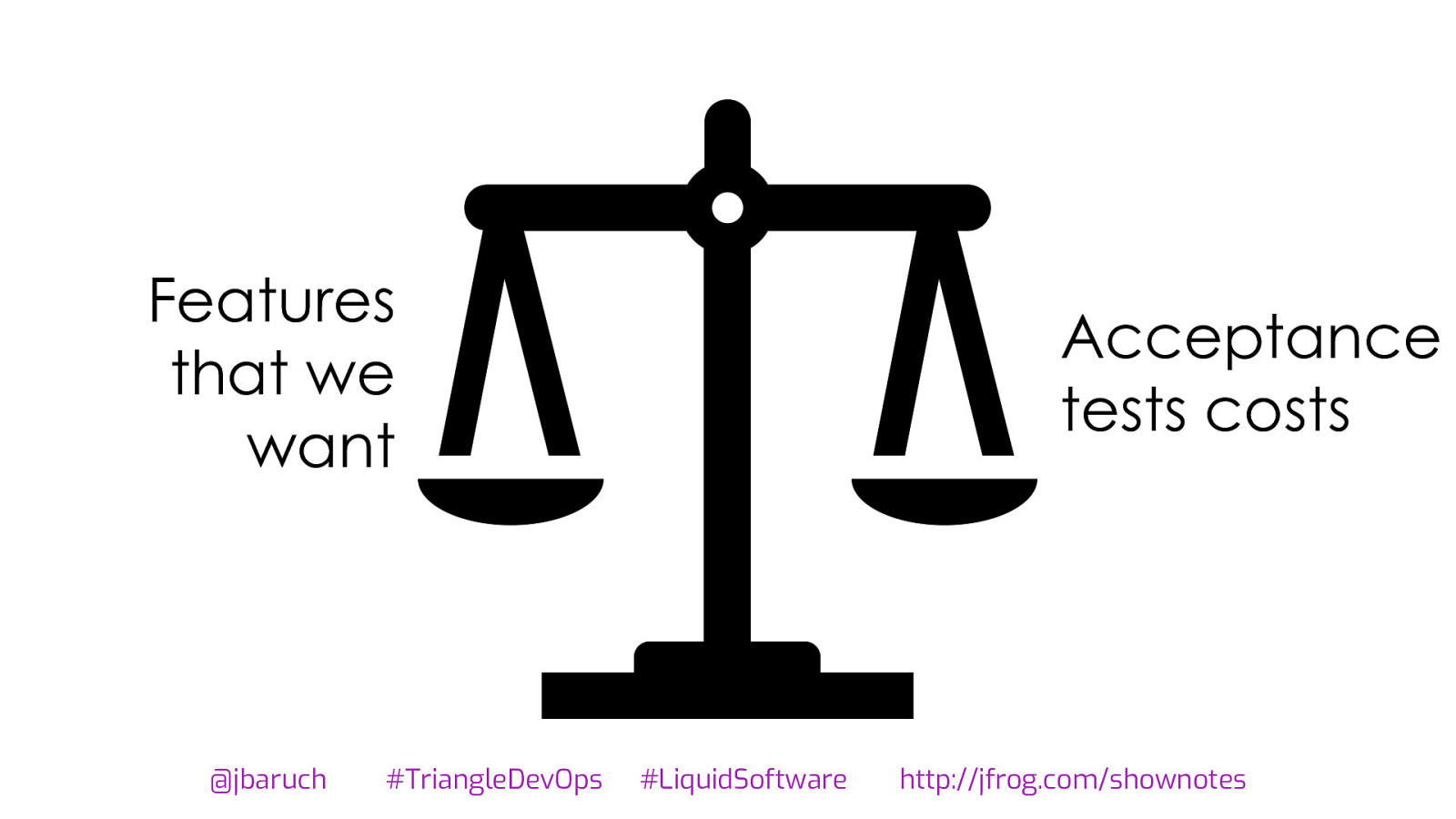
Features that we want @jbaruch #TriangleDevOps Acceptance tests costs #LiquidSoftware http://jfrog.com/shownotes

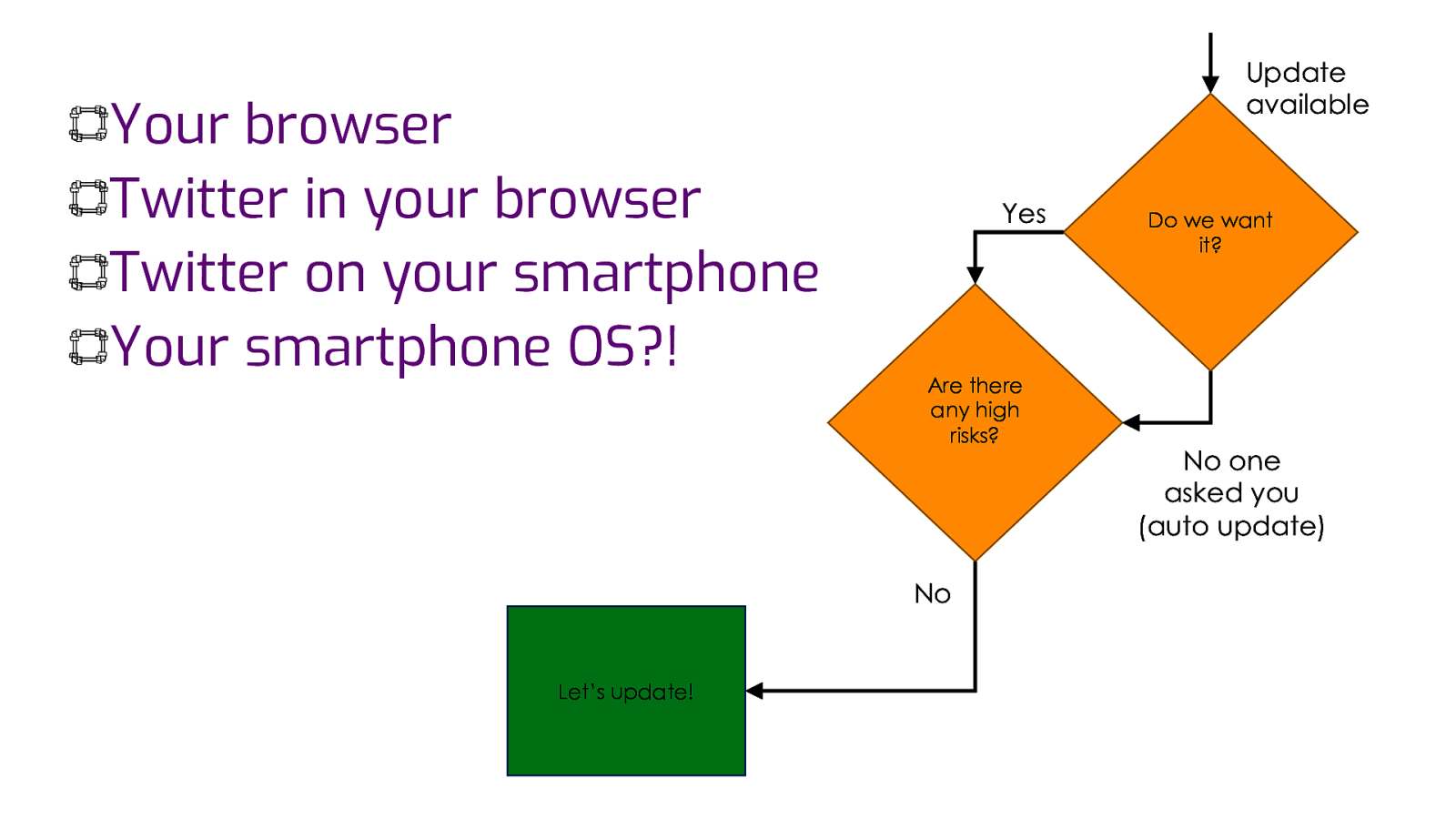
Your browser Twitter in your browser Twitter on your smartphone Your smartphone OS?! Update available Yes Are there any high risks? No Let’s update! Do we want it? No one asked you (auto update)

What can possibly go wrong?
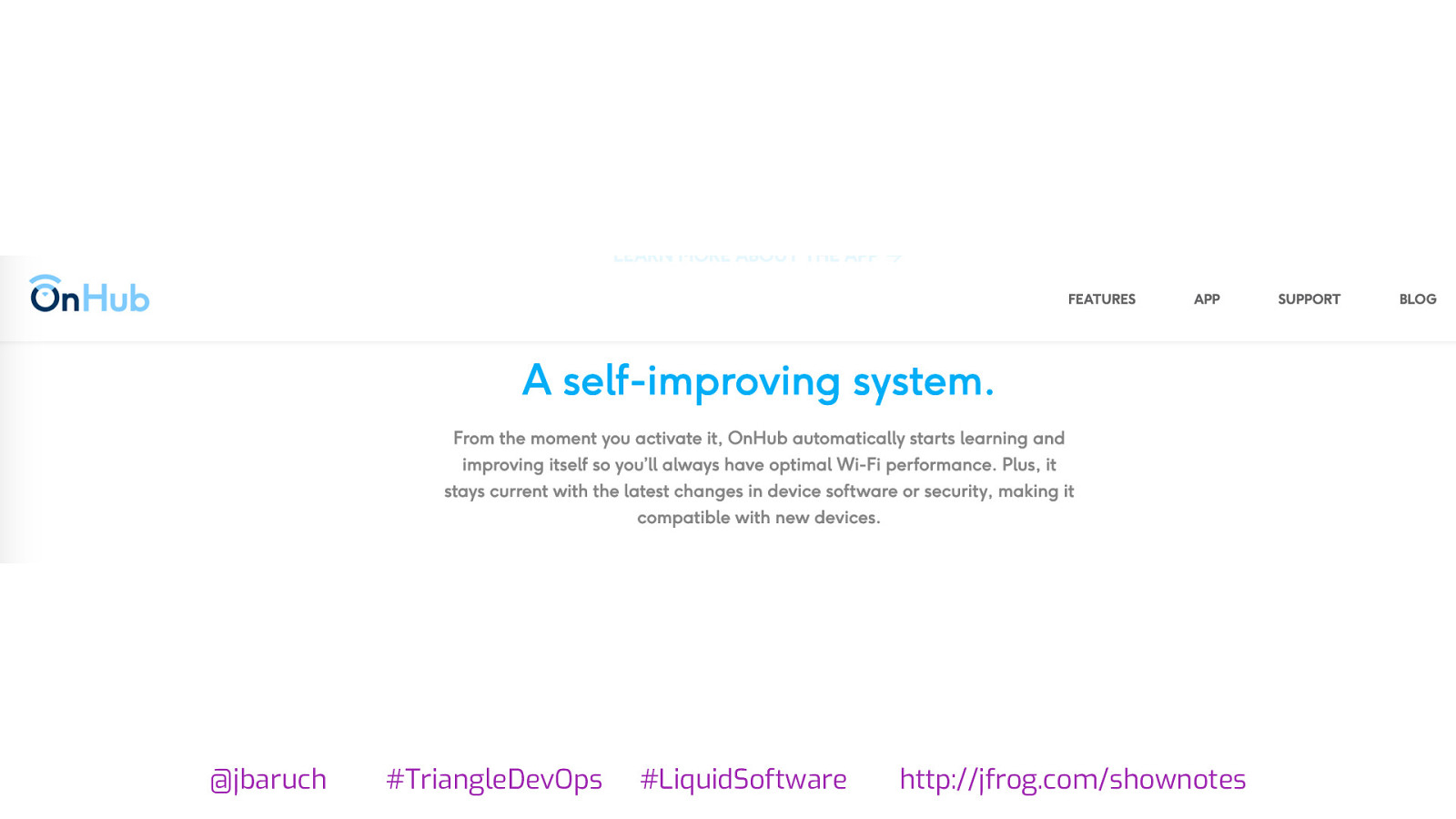
@jbaruch #TriangleDevOps #LiquidSoftware http://jfrog.com/shownotes
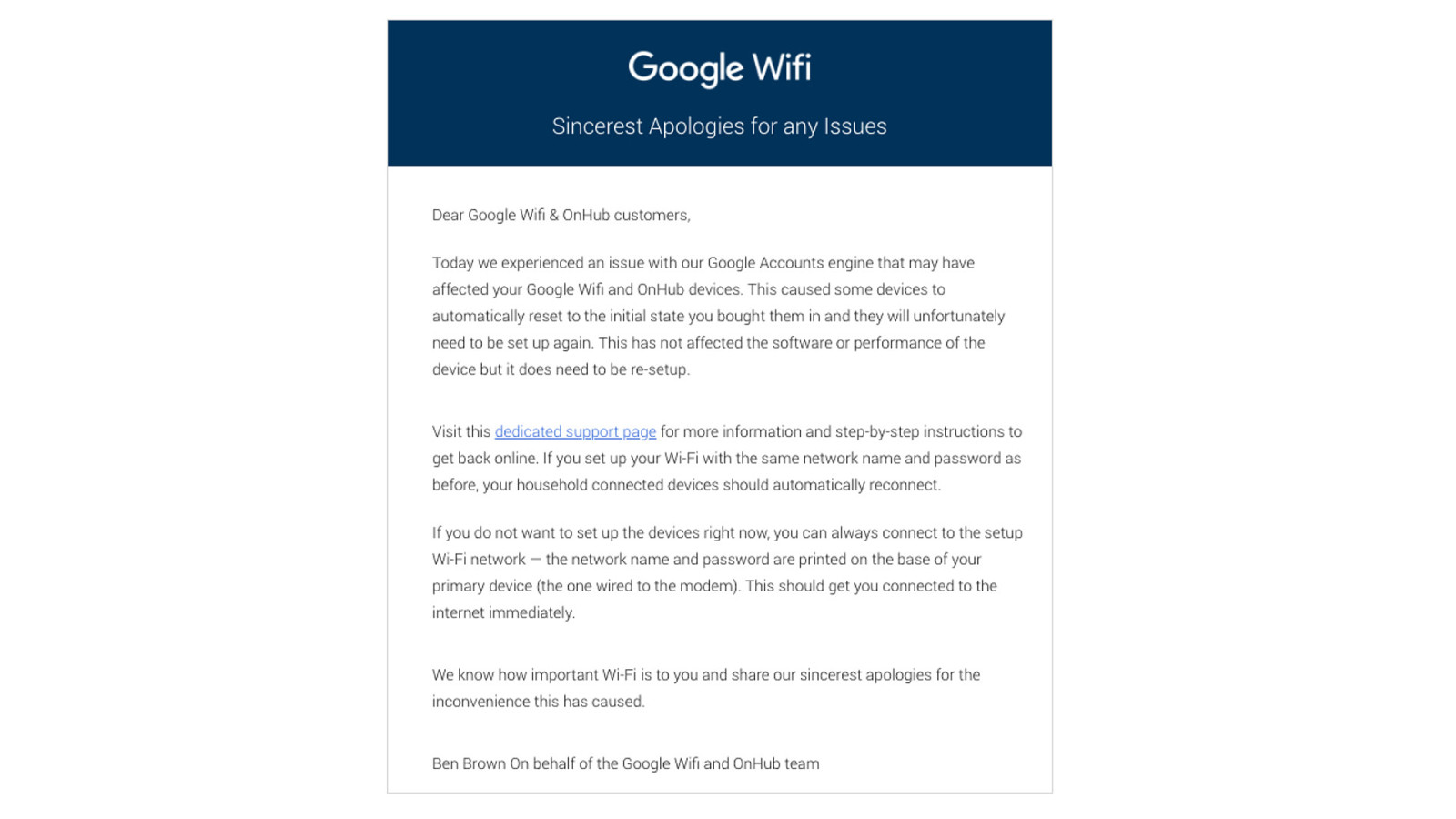
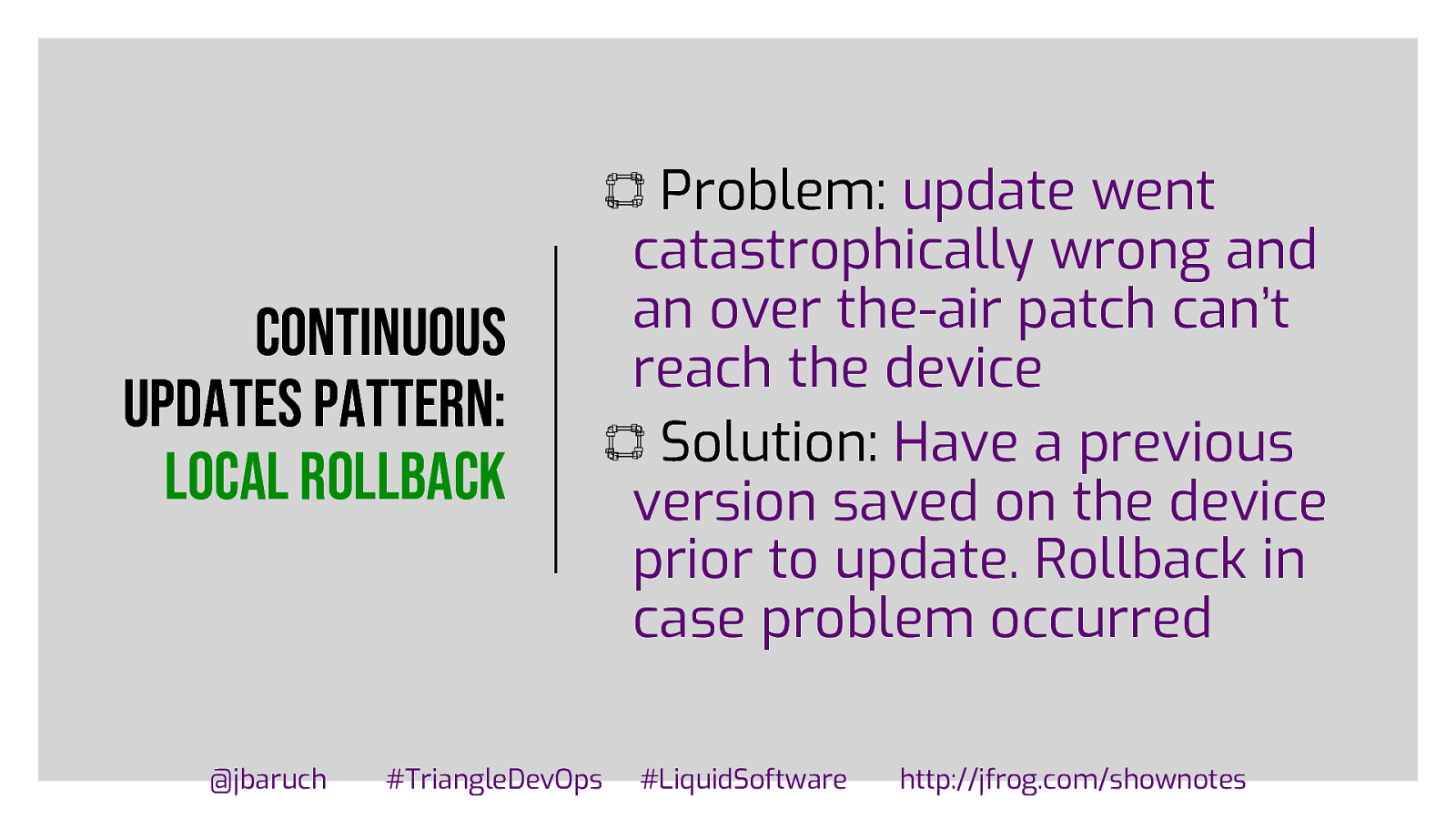
Continuous updates pattern: Local rollback @jbaruch #TriangleDevOps Problem: update went catastrophically wrong and an over the-air patch can’t reach the device Solution: Have a previous version saved on the device prior to update. Rollback in case problem occurred #LiquidSoftware http://jfrog.com/shownotes
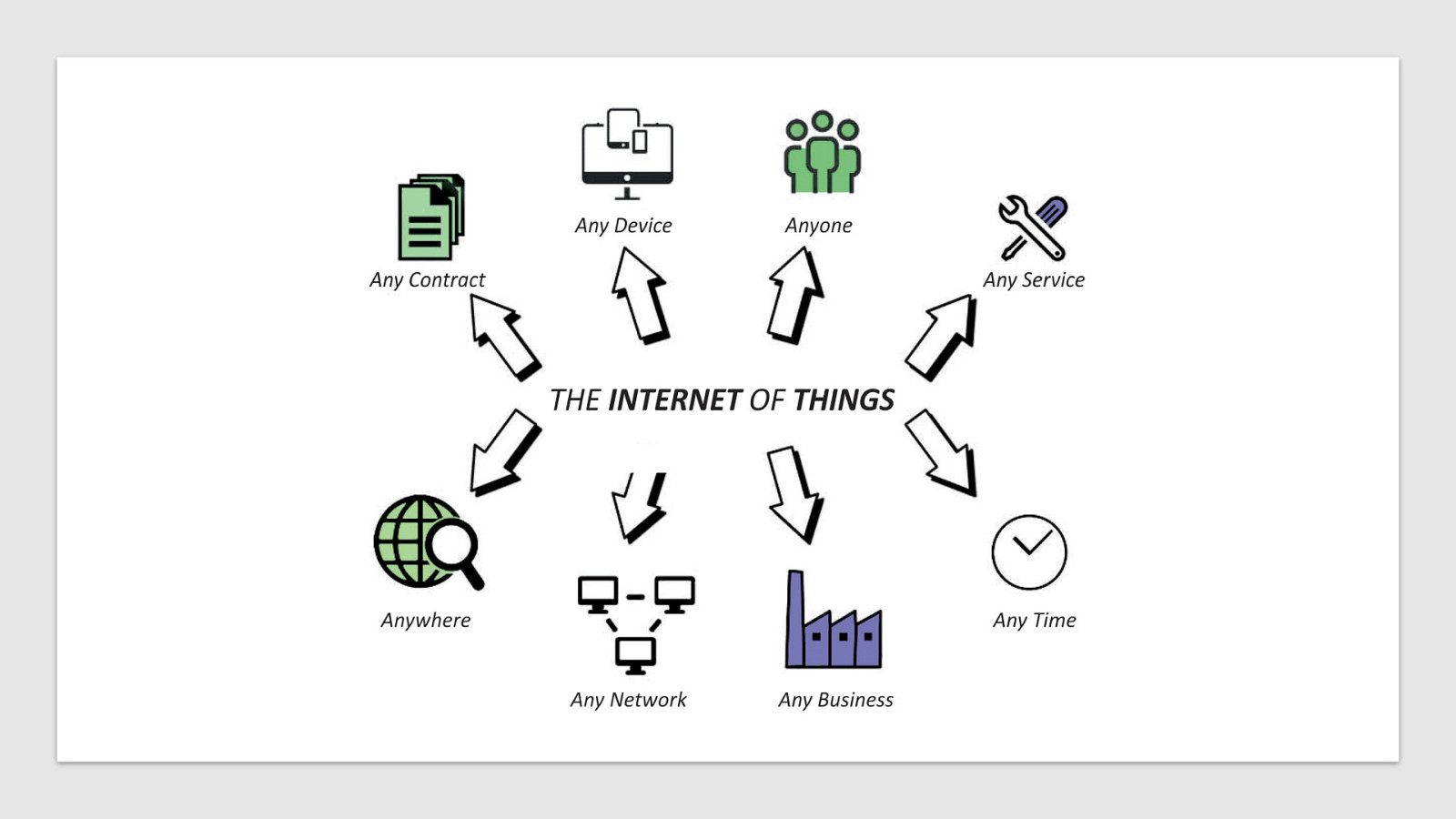
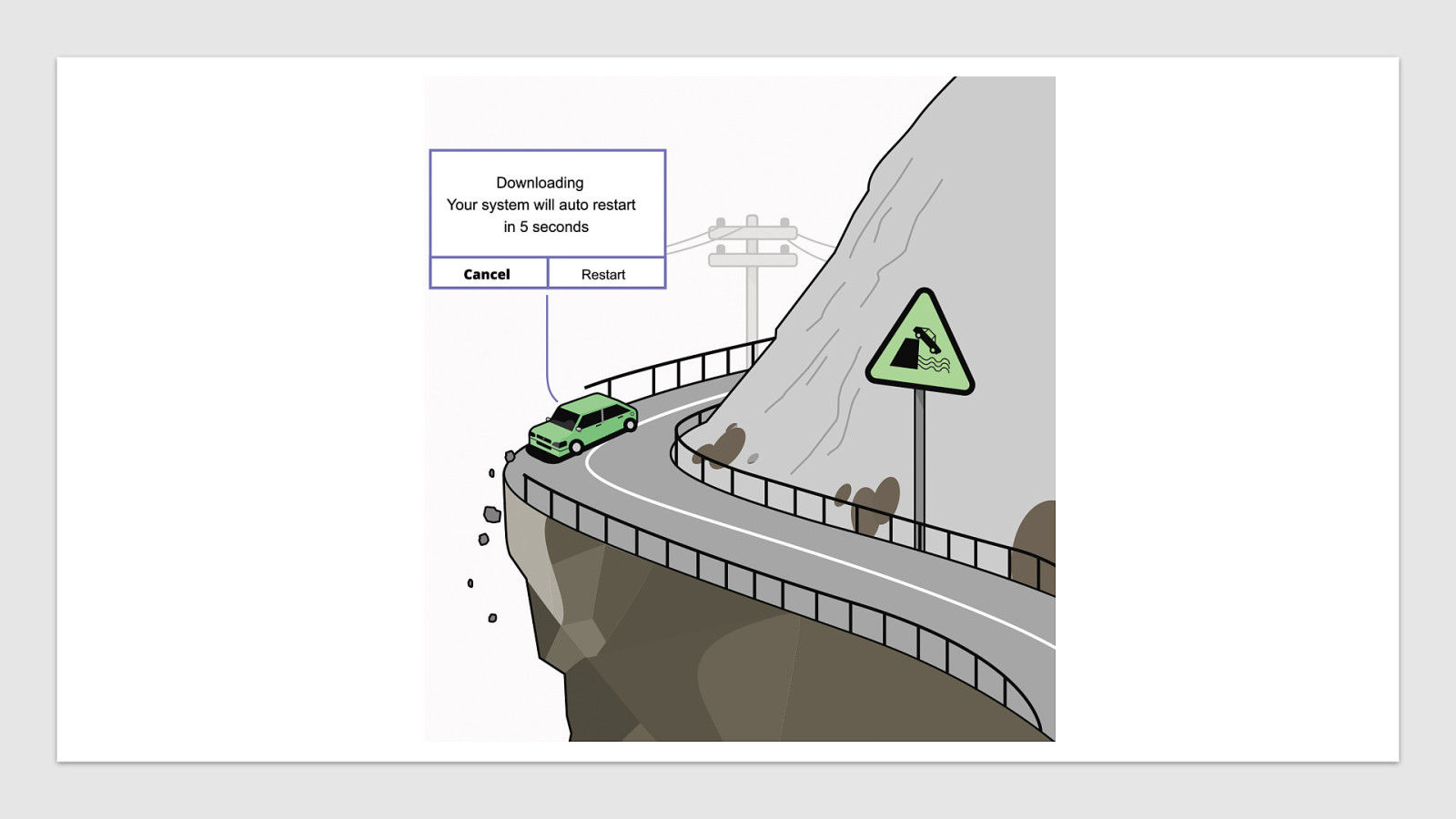

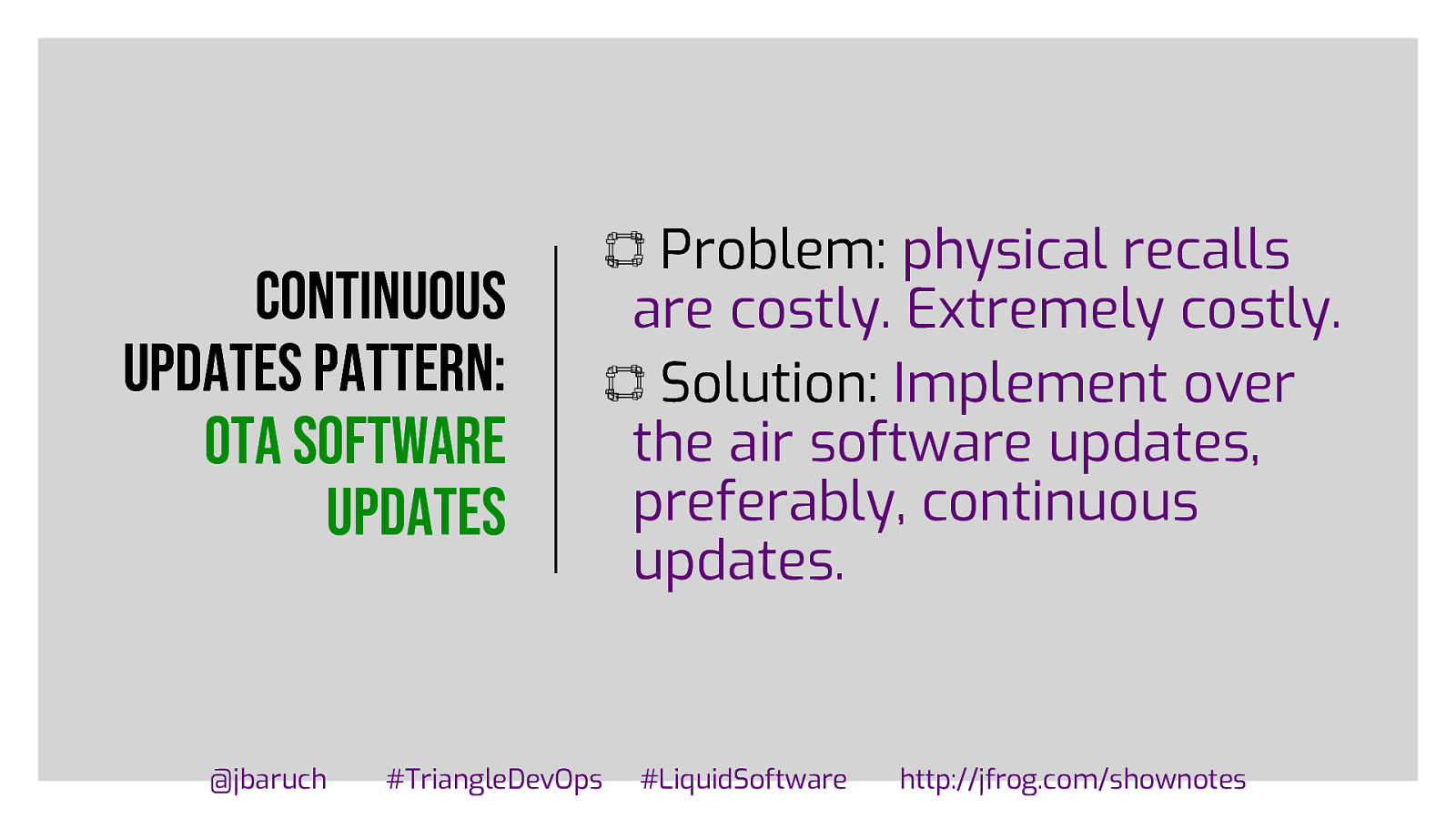
Continuous updates pattern: OTA software updates @jbaruch #TriangleDevOps Problem: physical recalls are costly. Extremely costly. Solution: Implement over the air software updates, preferably, continuous updates. #LiquidSoftware http://jfrog.com/shownotes
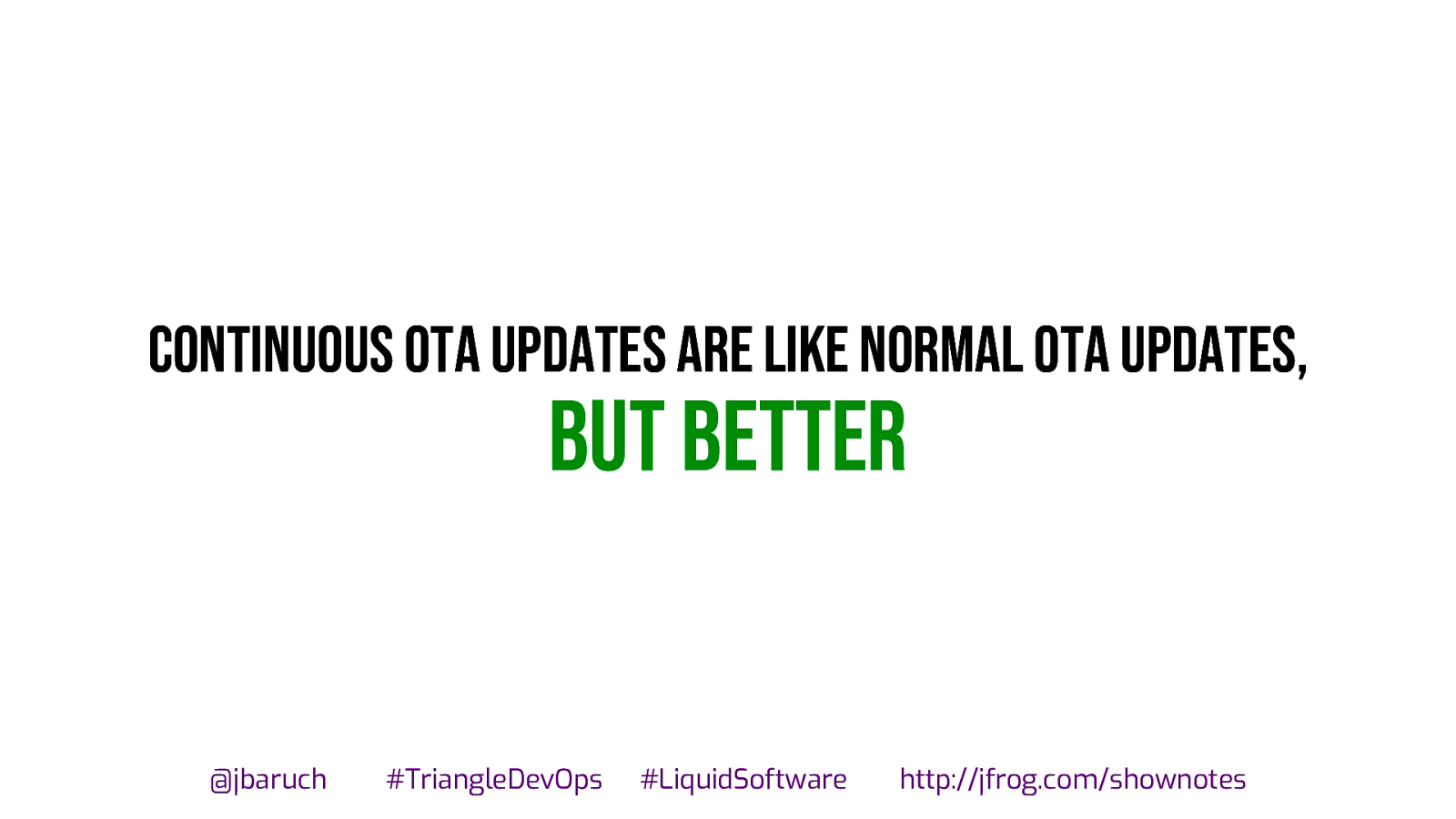
continuous OTA updates are like normal OTA updates, but better @jbaruch #TriangleDevOps #LiquidSoftware http://jfrog.com/shownotes
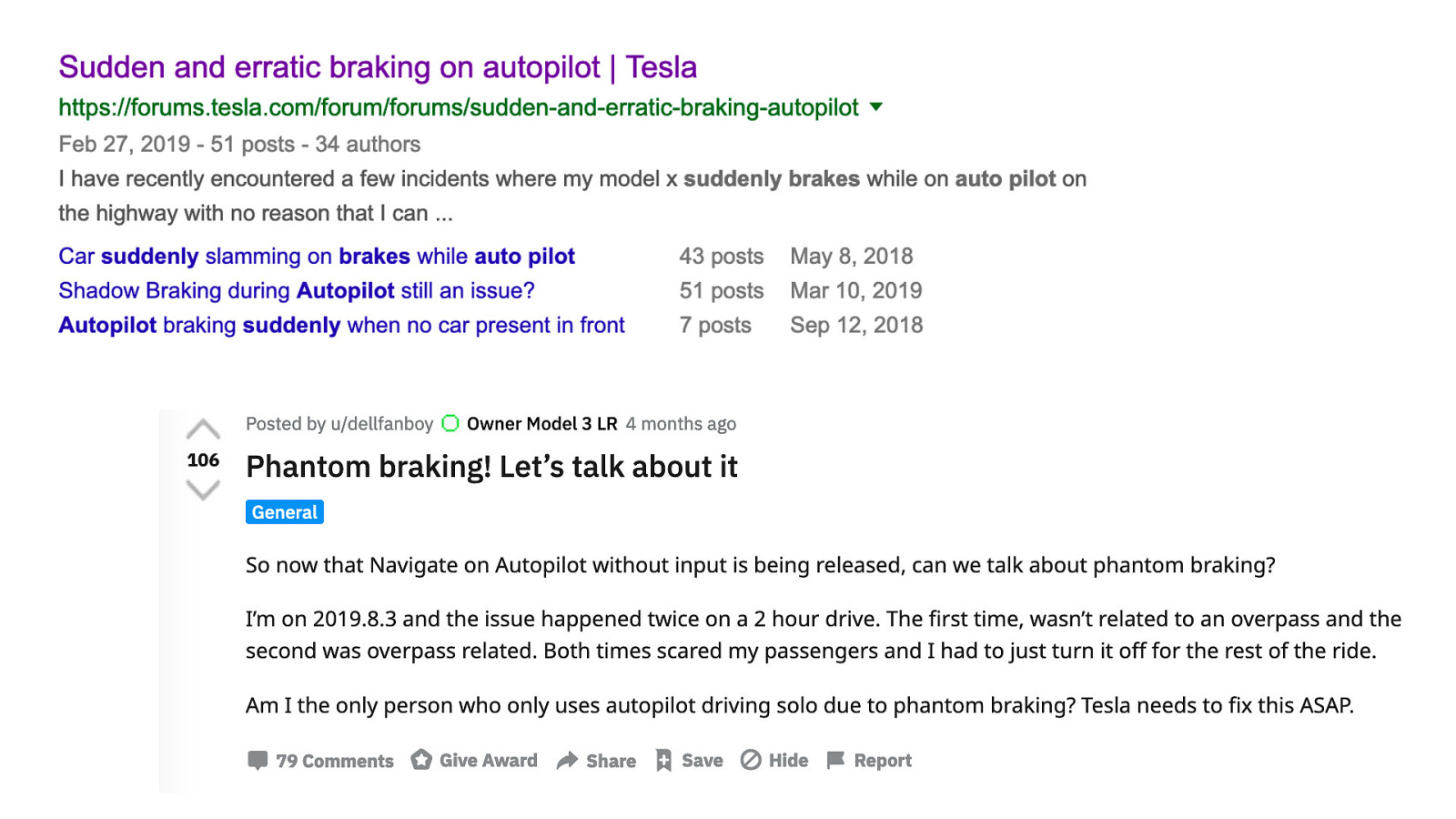
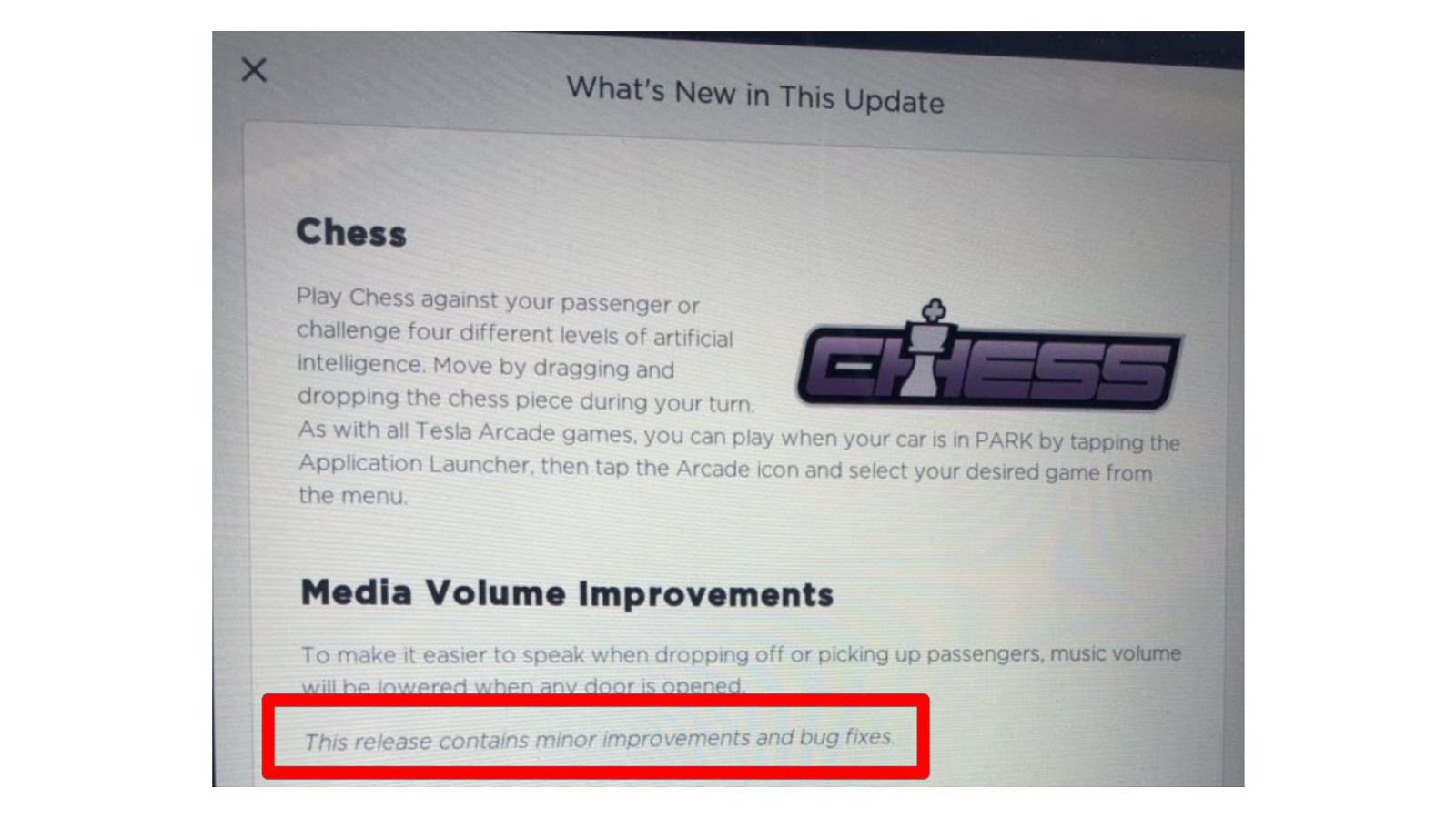
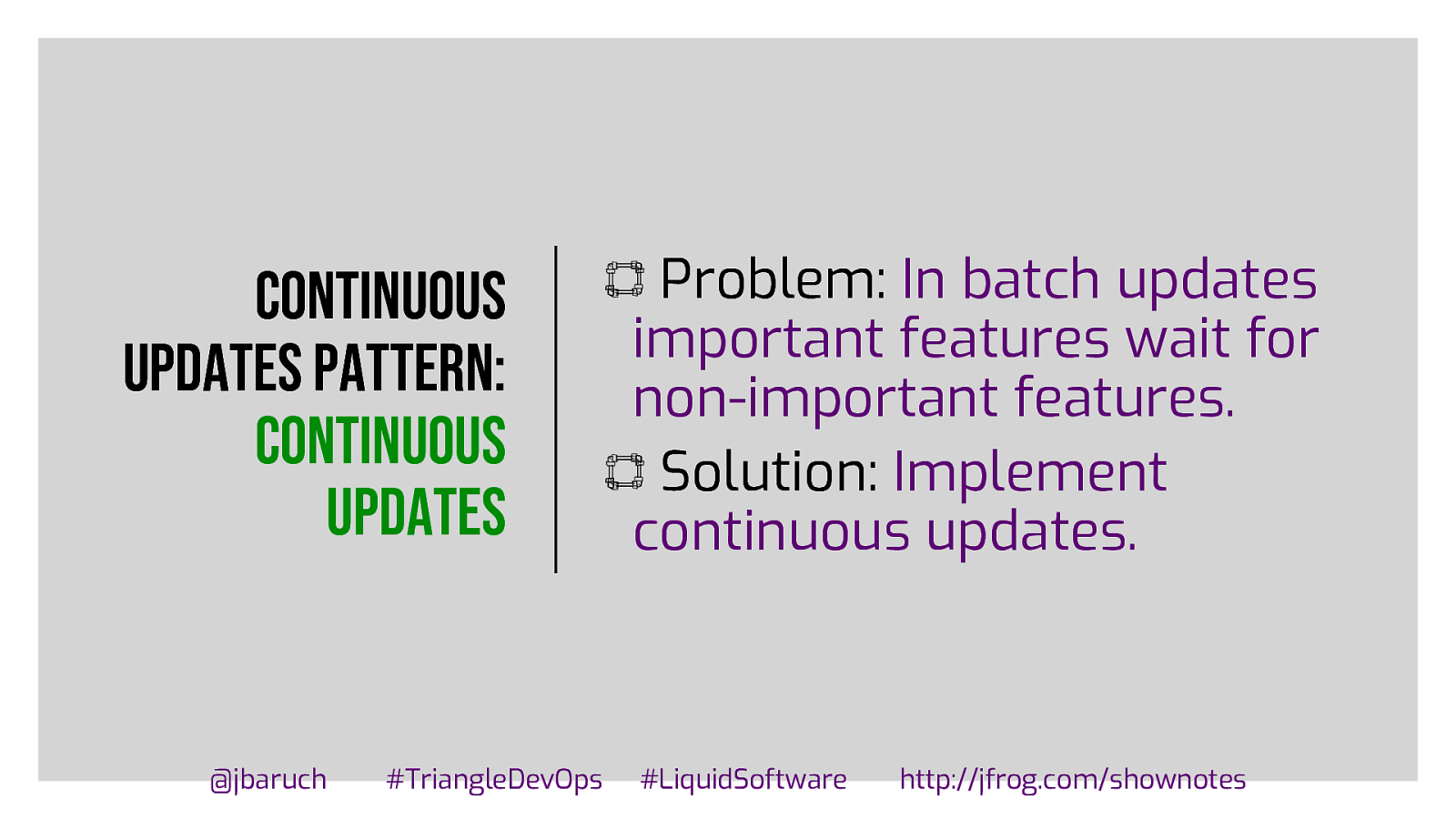
Continuous updates pattern: continuous updates @jbaruch #TriangleDevOps Problem: In batch updates important features wait for non-important features. Solution: Implement continuous updates. #LiquidSoftware http://jfrog.com/shownotes
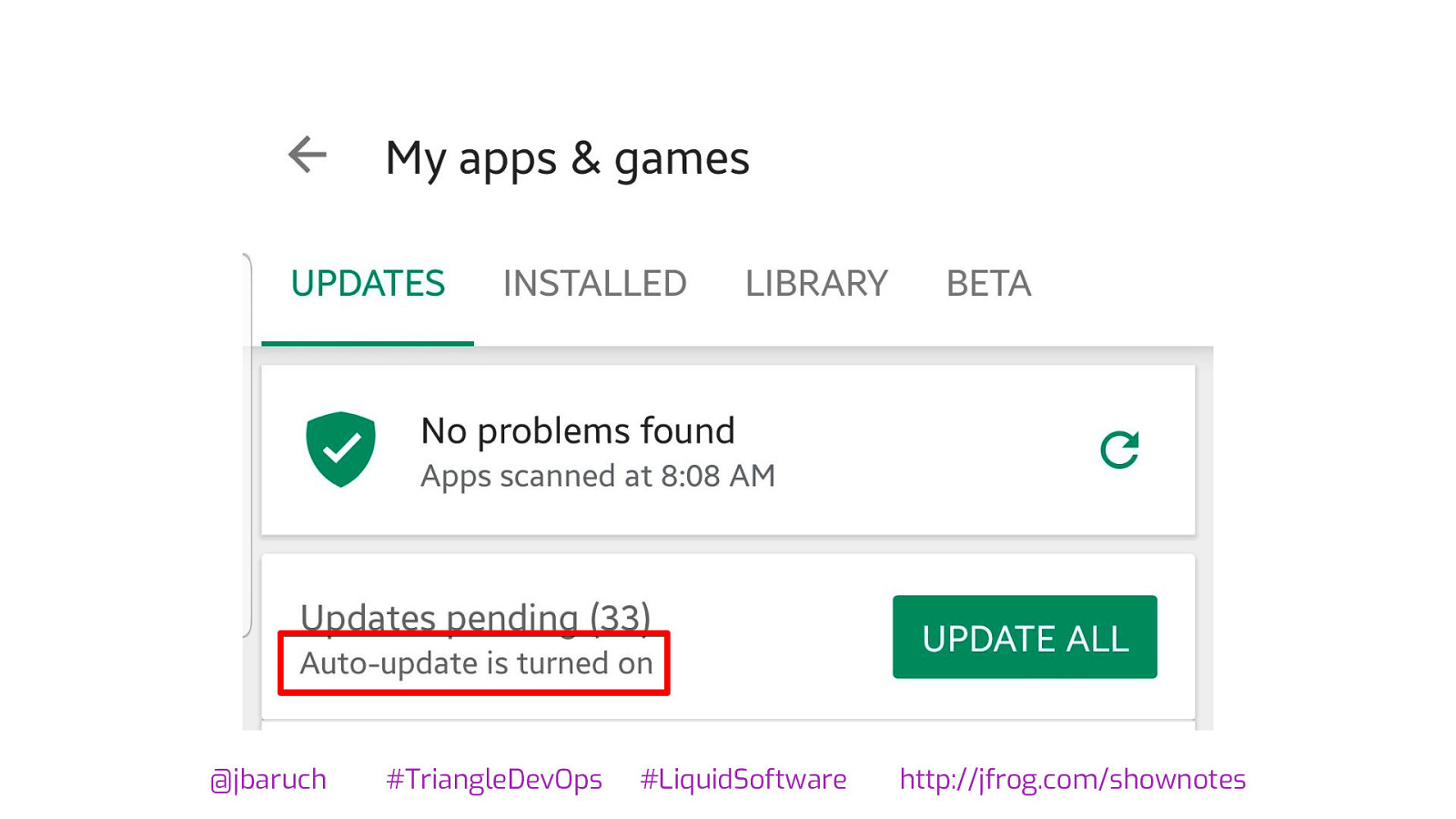
@jbaruch #TriangleDevOps #LiquidSoftware http://jfrog.com/shownotes
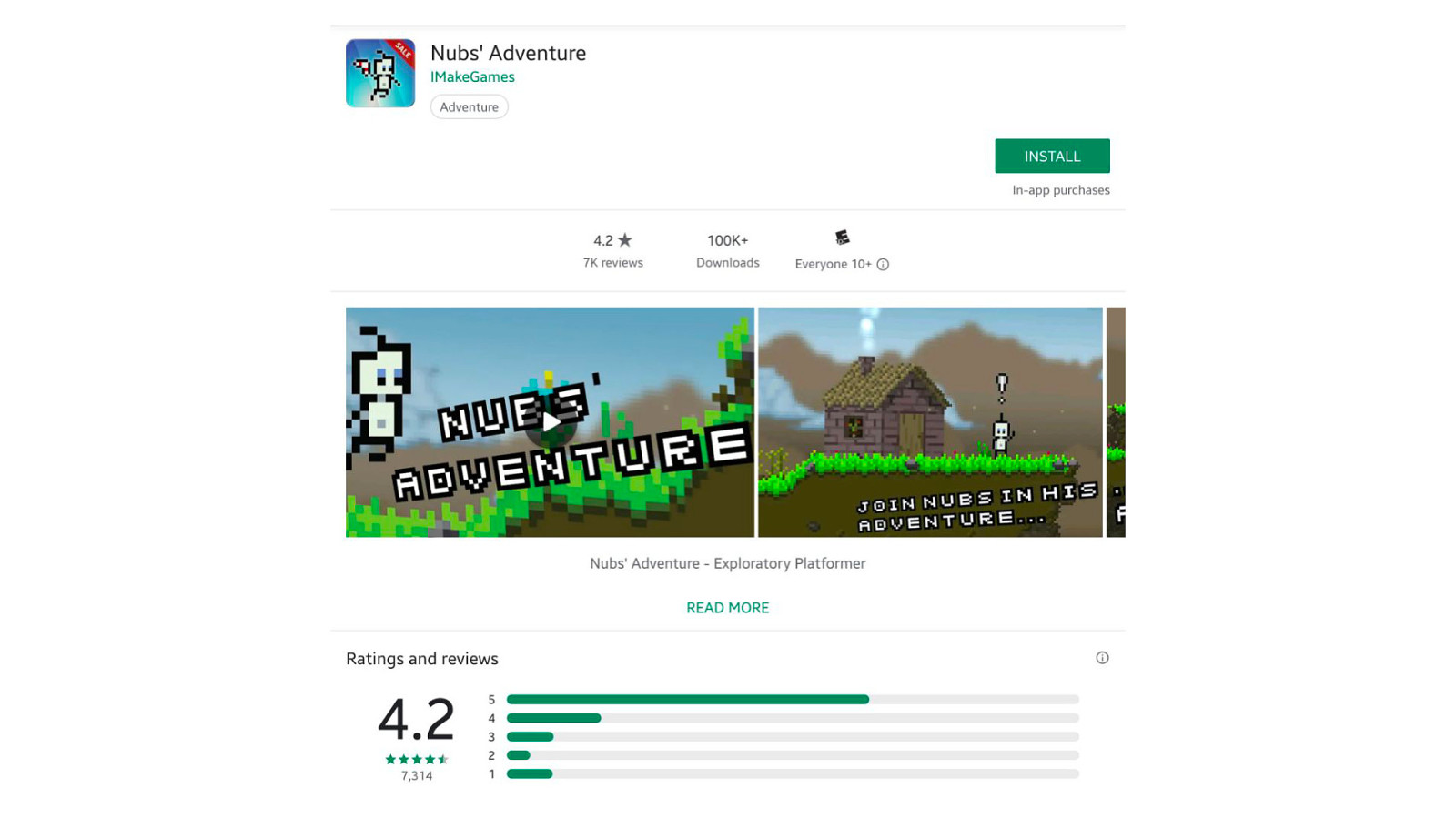
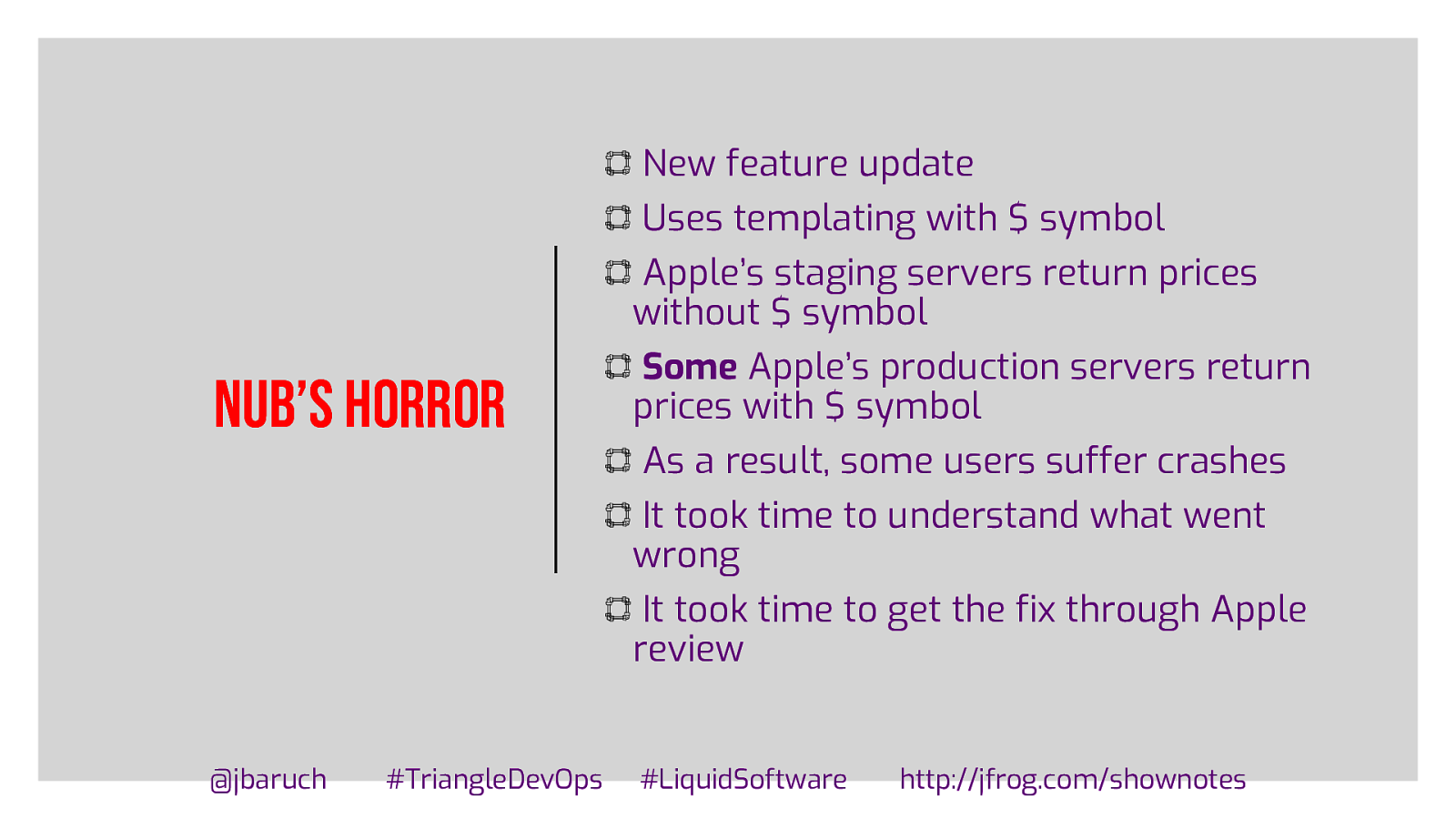
Nub’s horror New feature update Uses templating with $ symbol Apple’s staging servers return prices without $ symbol Some Apple’s production servers return prices with $ symbol As a result, some users suffer crashes It took time to understand what went wrong It took time to get the fix through Apple review @jbaruch #LiquidSoftware #TriangleDevOps http://jfrog.com/shownotes
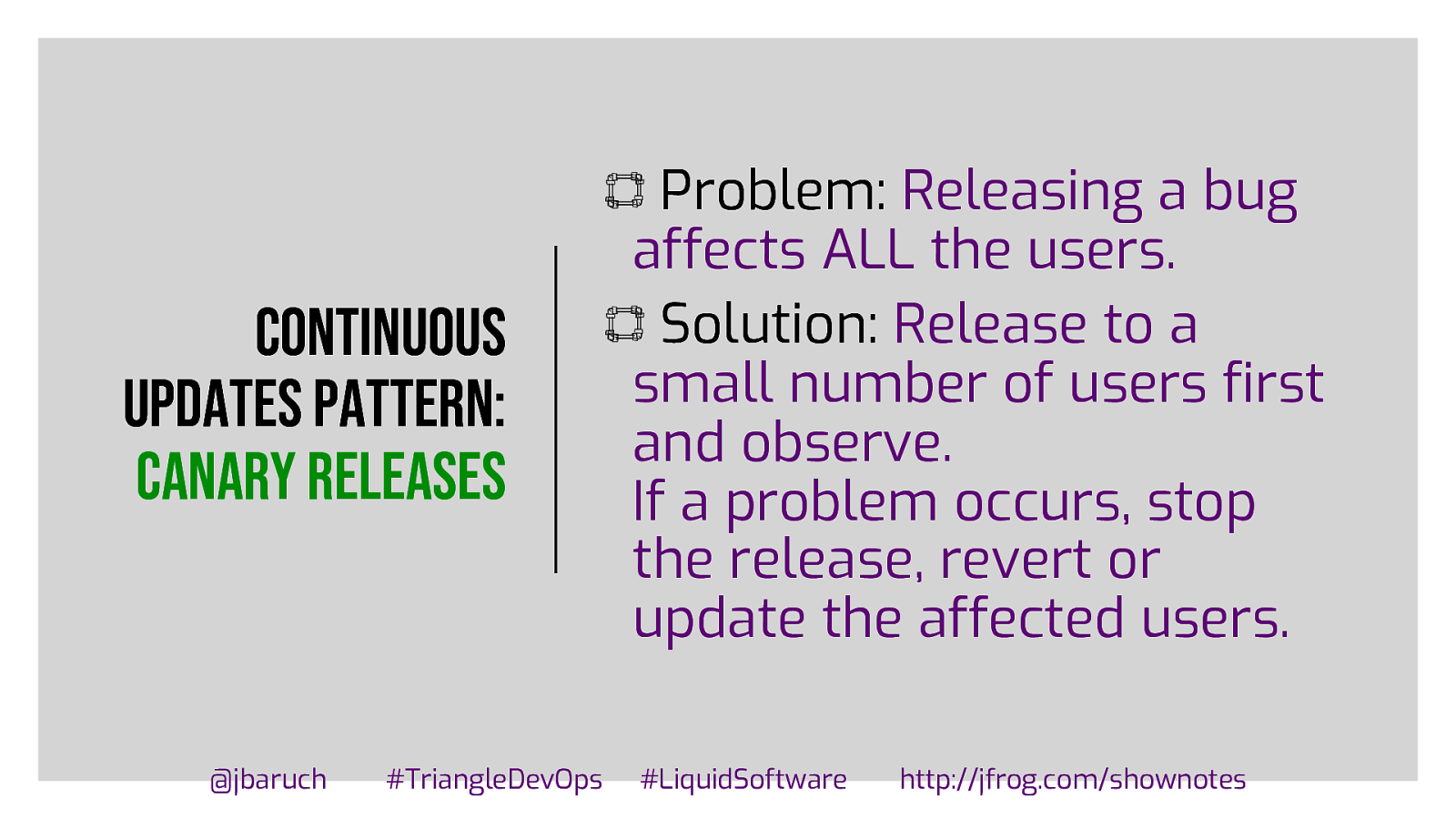
Continuous updates pattern: Canary releases @jbaruch #TriangleDevOps Problem: Releasing a bug affects ALL the users. Solution: Release to a small number of users first and observe. If a problem occurs, stop the release, revert or update the affected users. #LiquidSoftware http://jfrog.com/shownotes
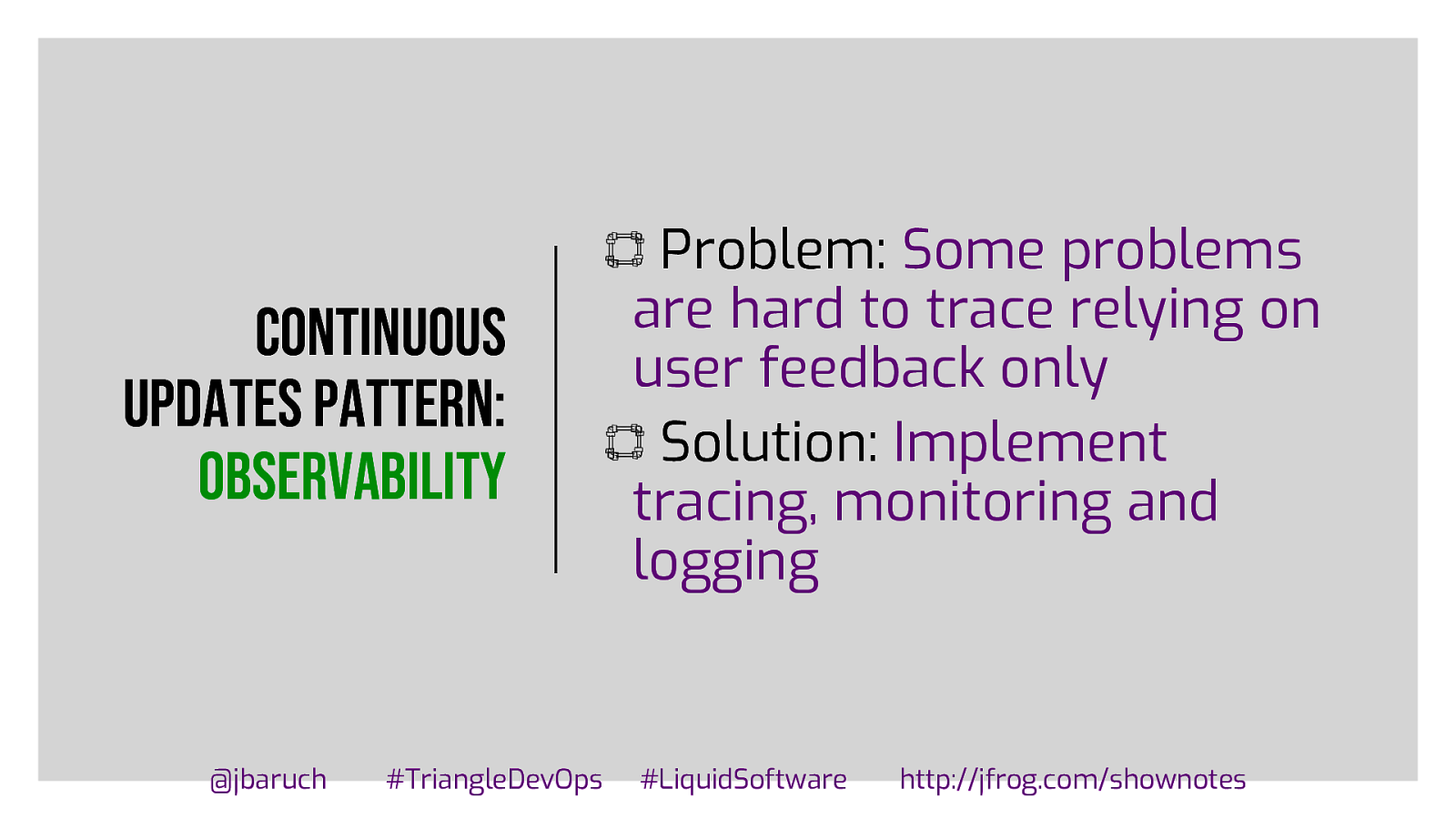
Continuous updates pattern: observability @jbaruch #TriangleDevOps Problem: Some problems are hard to trace relying on user feedback only Solution: Implement tracing, monitoring and logging #LiquidSoftware http://jfrog.com/shownotes
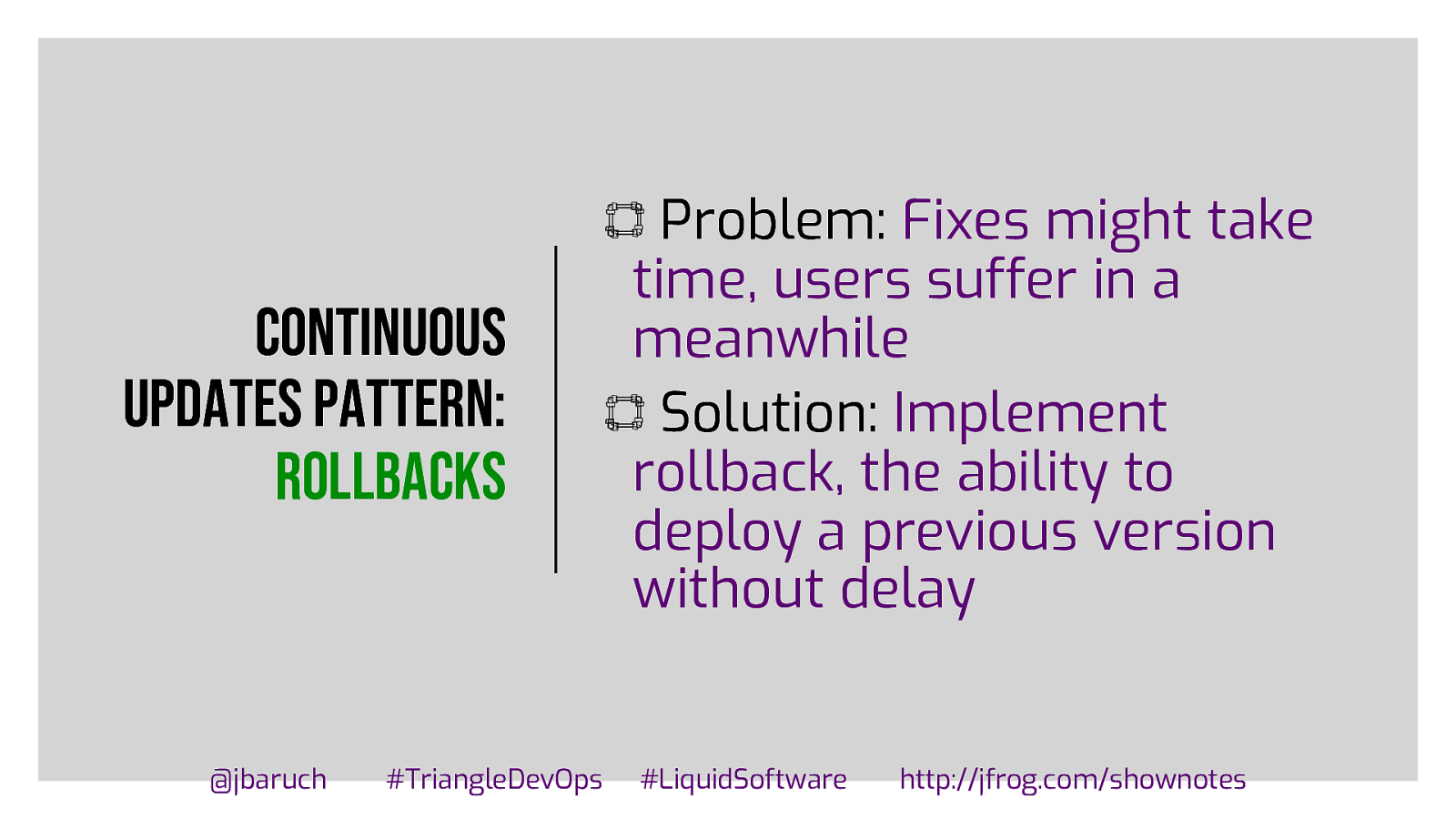
Continuous updates pattern: Rollbacks @jbaruch #TriangleDevOps Problem: Fixes might take time, users suffer in a meanwhile Solution: Implement rollback, the ability to deploy a previous version without delay #LiquidSoftware http://jfrog.com/shownotes
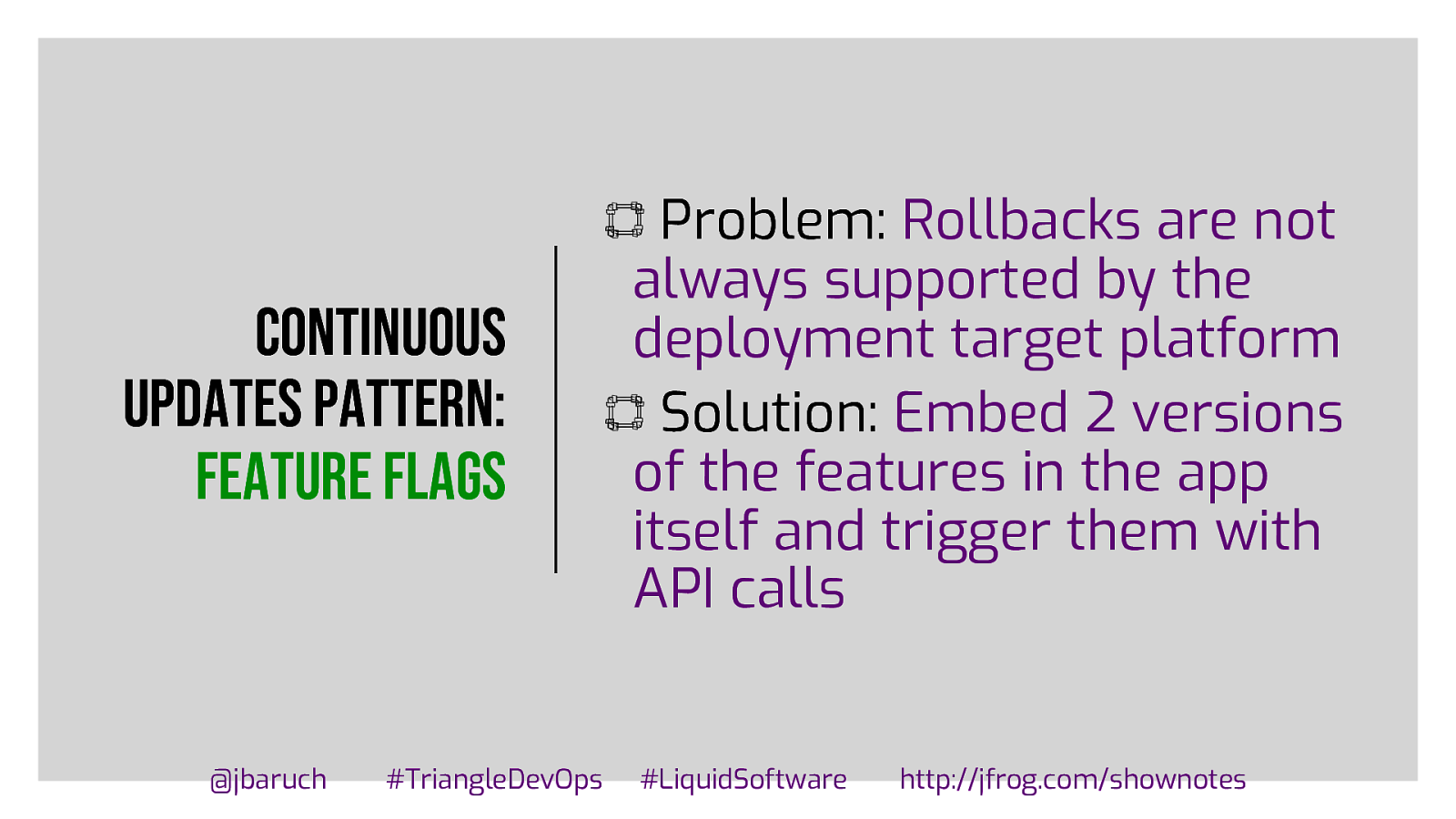
Continuous updates pattern: feature flags @jbaruch #TriangleDevOps Problem: Rollbacks are not always supported by the deployment target platform Solution: Embed 2 versions of the features in the app itself and trigger them with API calls #LiquidSoftware http://jfrog.com/shownotes

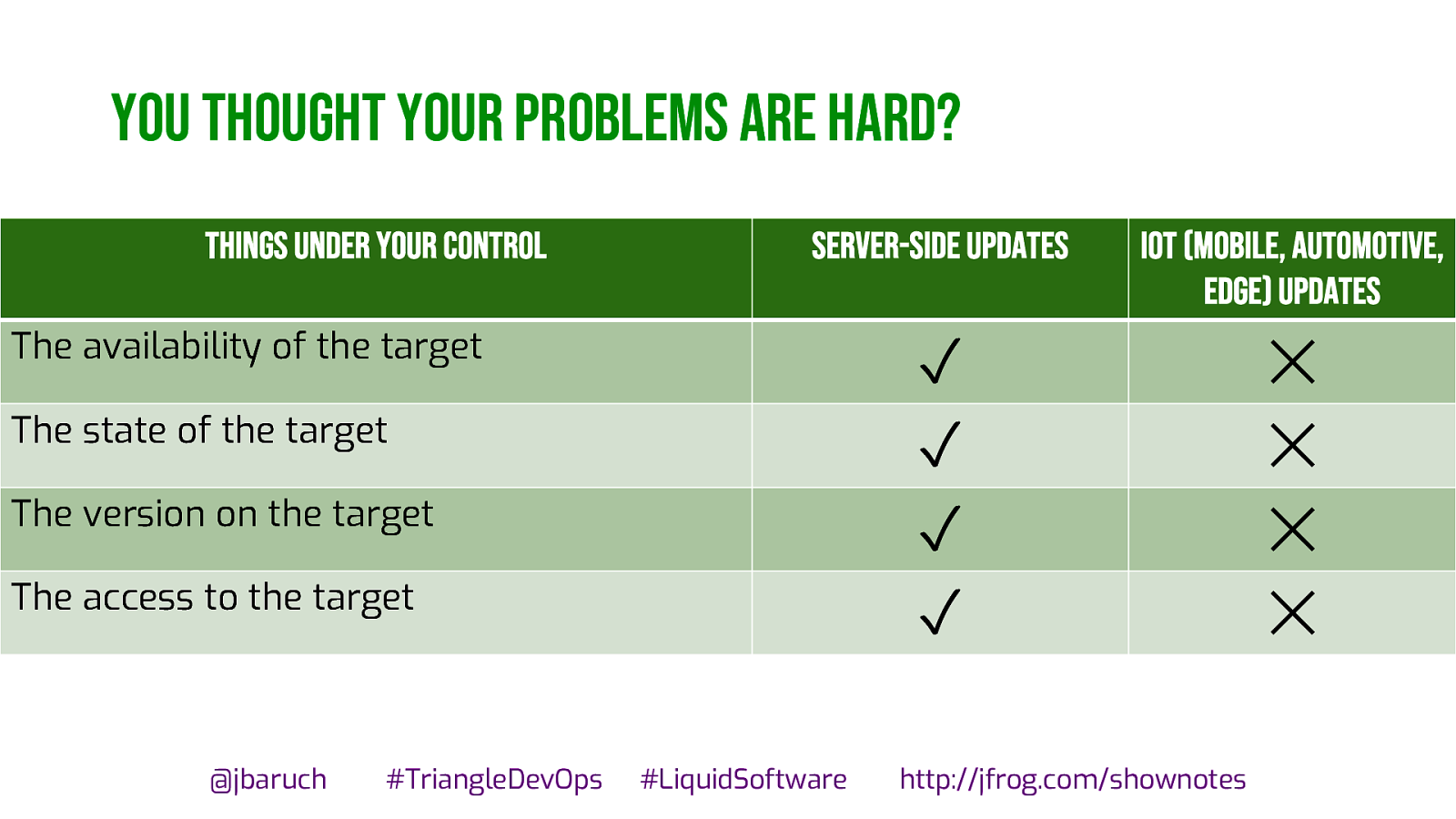
You thought your problems are hard? Things under your control Server-side Updates IoT (Mobile, Automotive, Edge) Updates ✓ ✓ ✓ ✓ ✕ ✕ ✕ ✕ The availability of the target The state of the target The version on the target The access to the target @jbaruch #TriangleDevOps #LiquidSoftware http://jfrog.com/shownotes
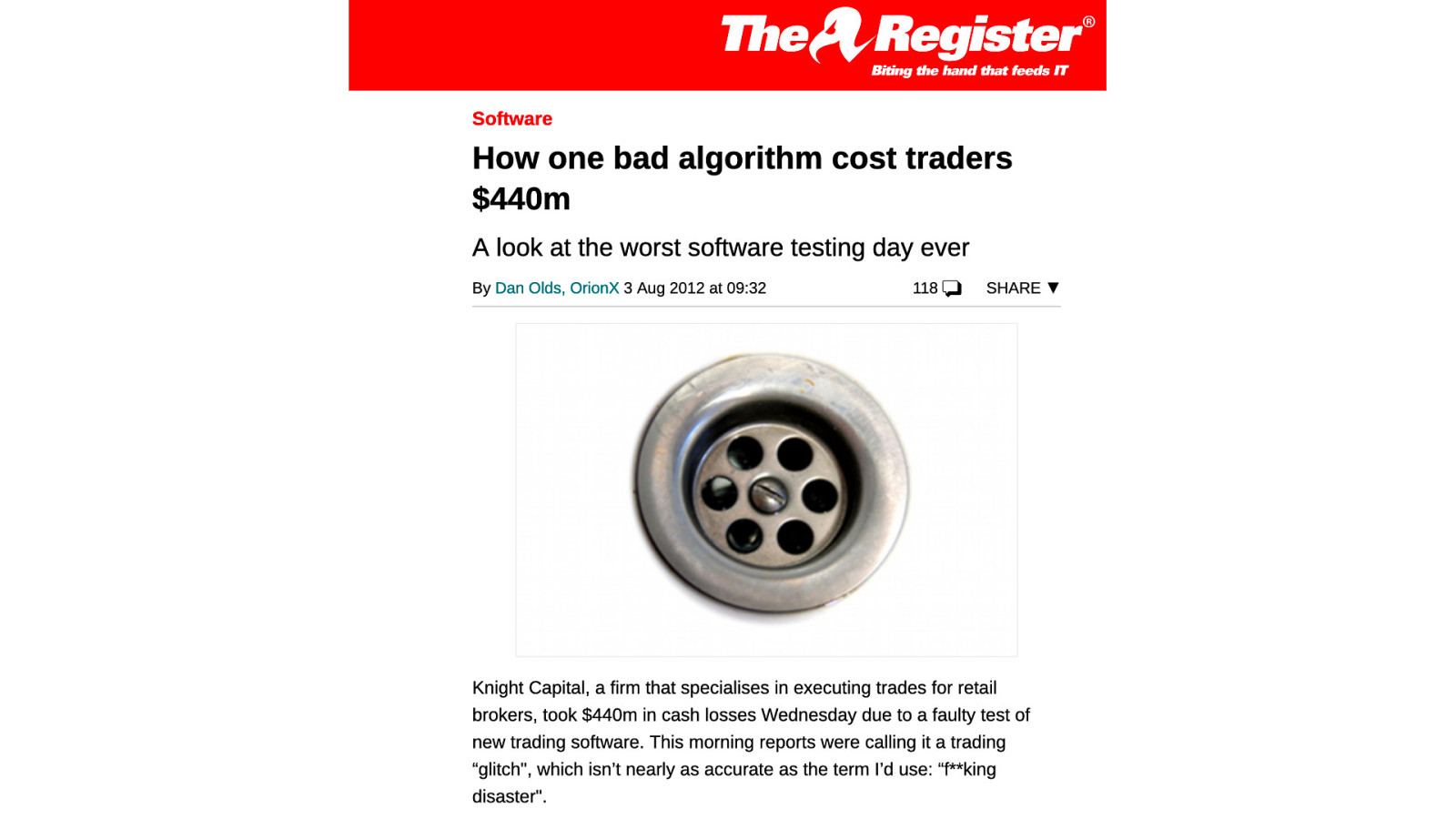
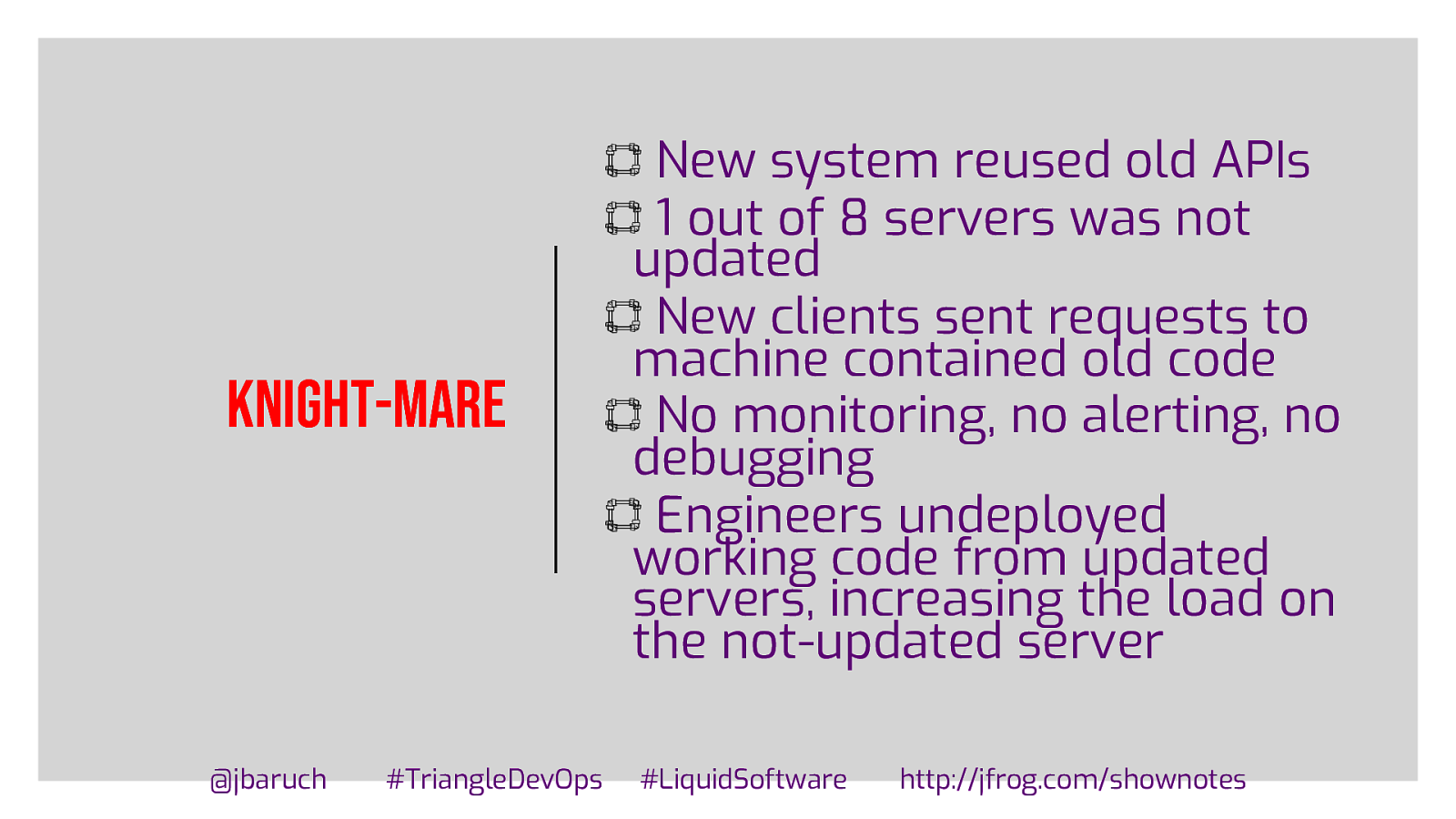
KNIGHT-MARE @jbaruch #TriangleDevOps New system reused old APIs 1 out of 8 servers was not updated New clients sent requests to machine contained old code No monitoring, no alerting, no debugging Engineers undeployed working code from updated servers, increasing the load on the not-updated server #LiquidSoftware http://jfrog.com/shownotes
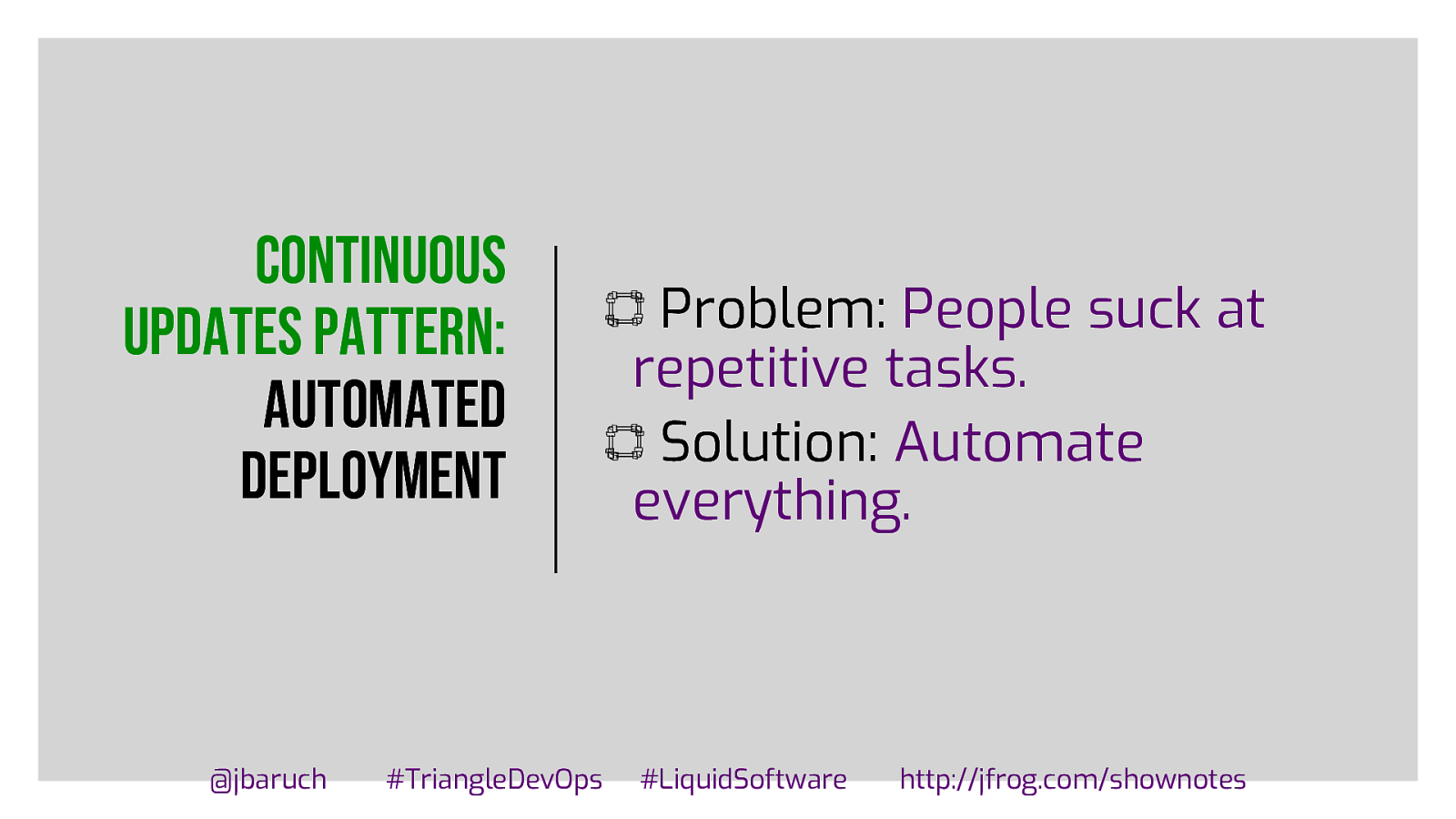
Continuous updates pattern: Automated deployment @jbaruch #TriangleDevOps Problem: People suck at repetitive tasks. Solution: Automate everything. #LiquidSoftware http://jfrog.com/shownotes
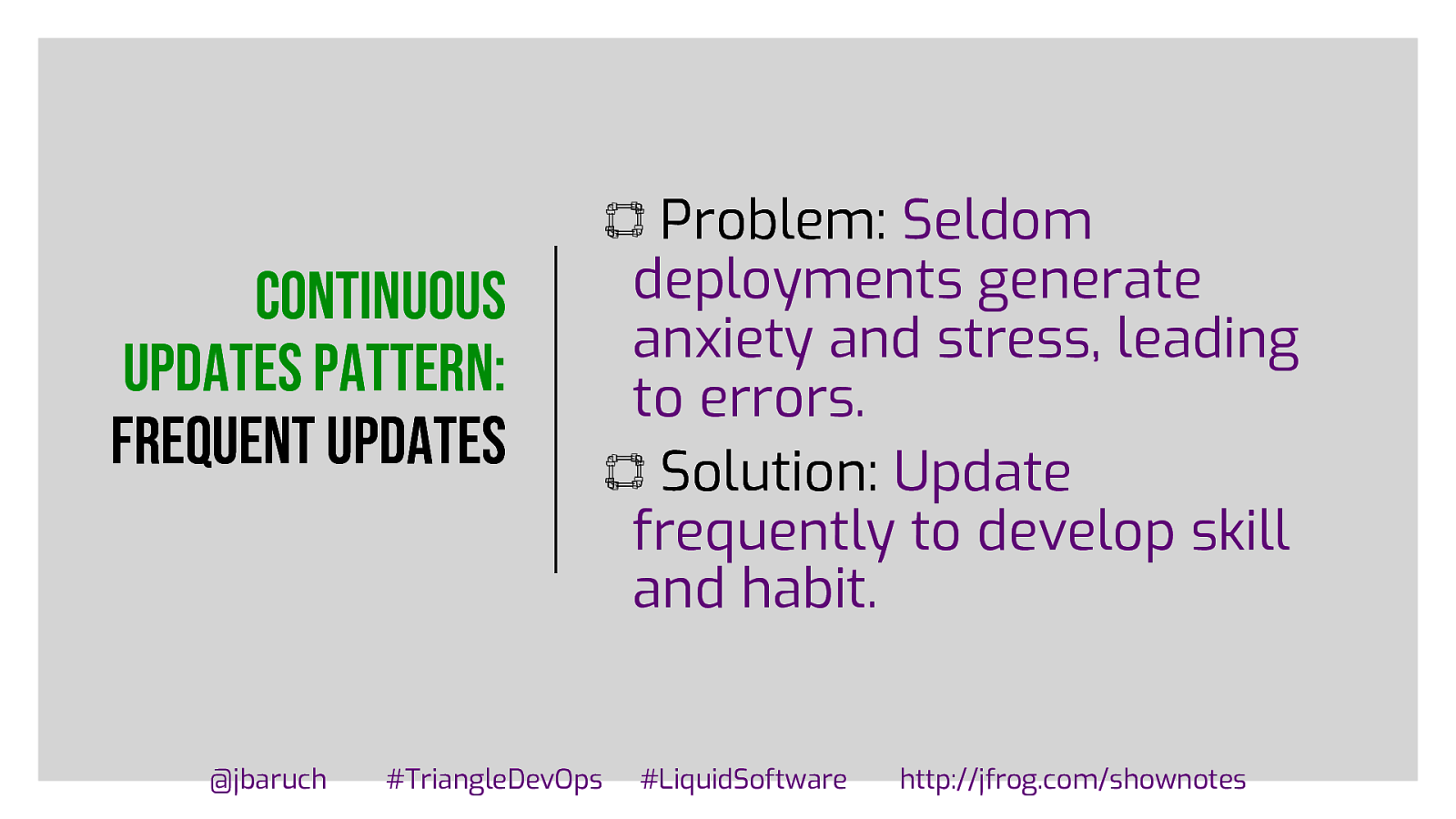
Continuous updates pattern: frequent updates @jbaruch #TriangleDevOps Problem: Seldom deployments generate anxiety and stress, leading to errors. Solution: Update frequently to develop skill and habit. #LiquidSoftware http://jfrog.com/shownotes
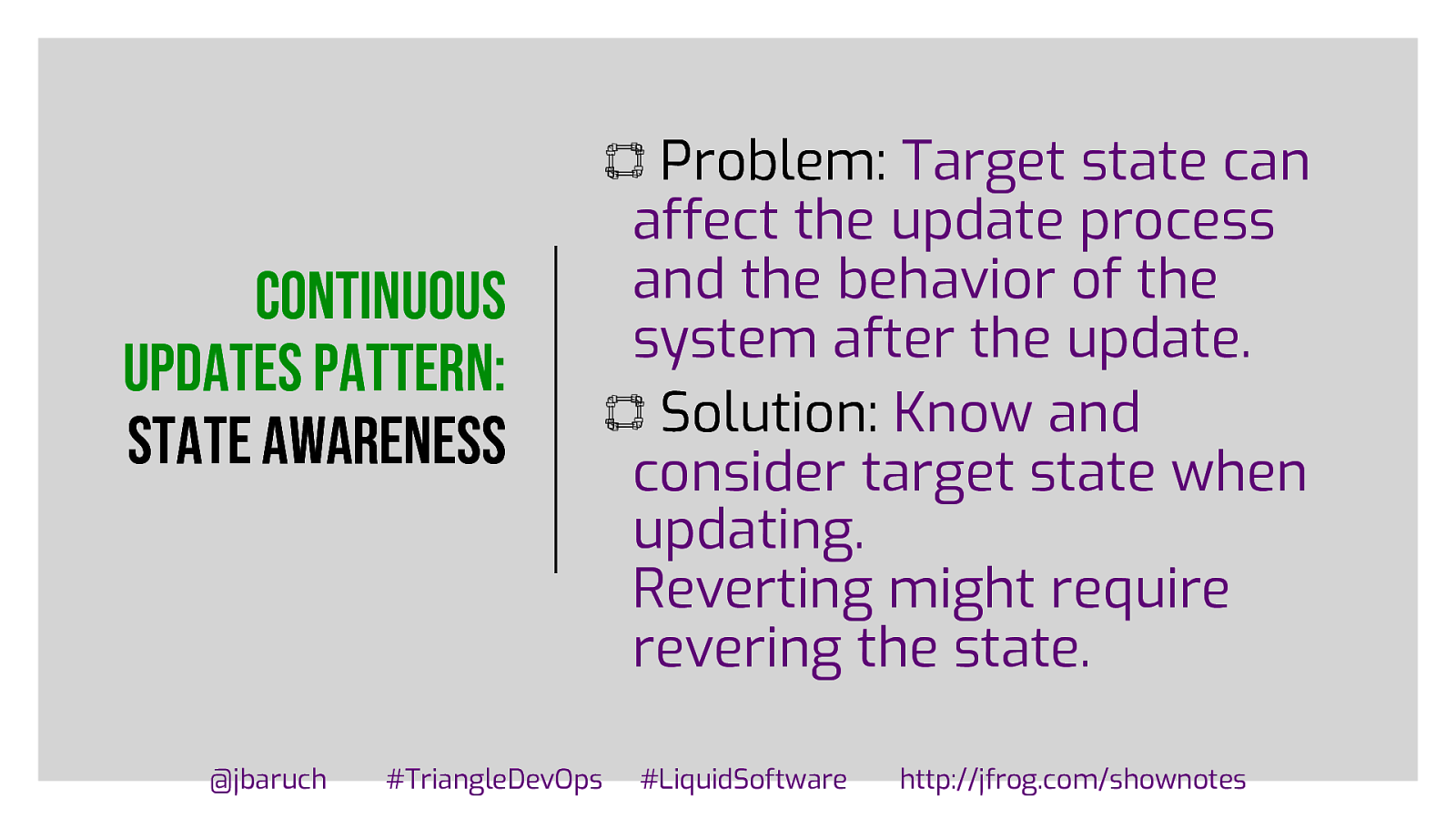
Continuous updates pattern: state awareness @jbaruch #TriangleDevOps Problem: Target state can affect the update process and the behavior of the system after the update. Solution: Know and consider target state when updating. Reverting might require revering the state. #LiquidSoftware http://jfrog.com/shownotes
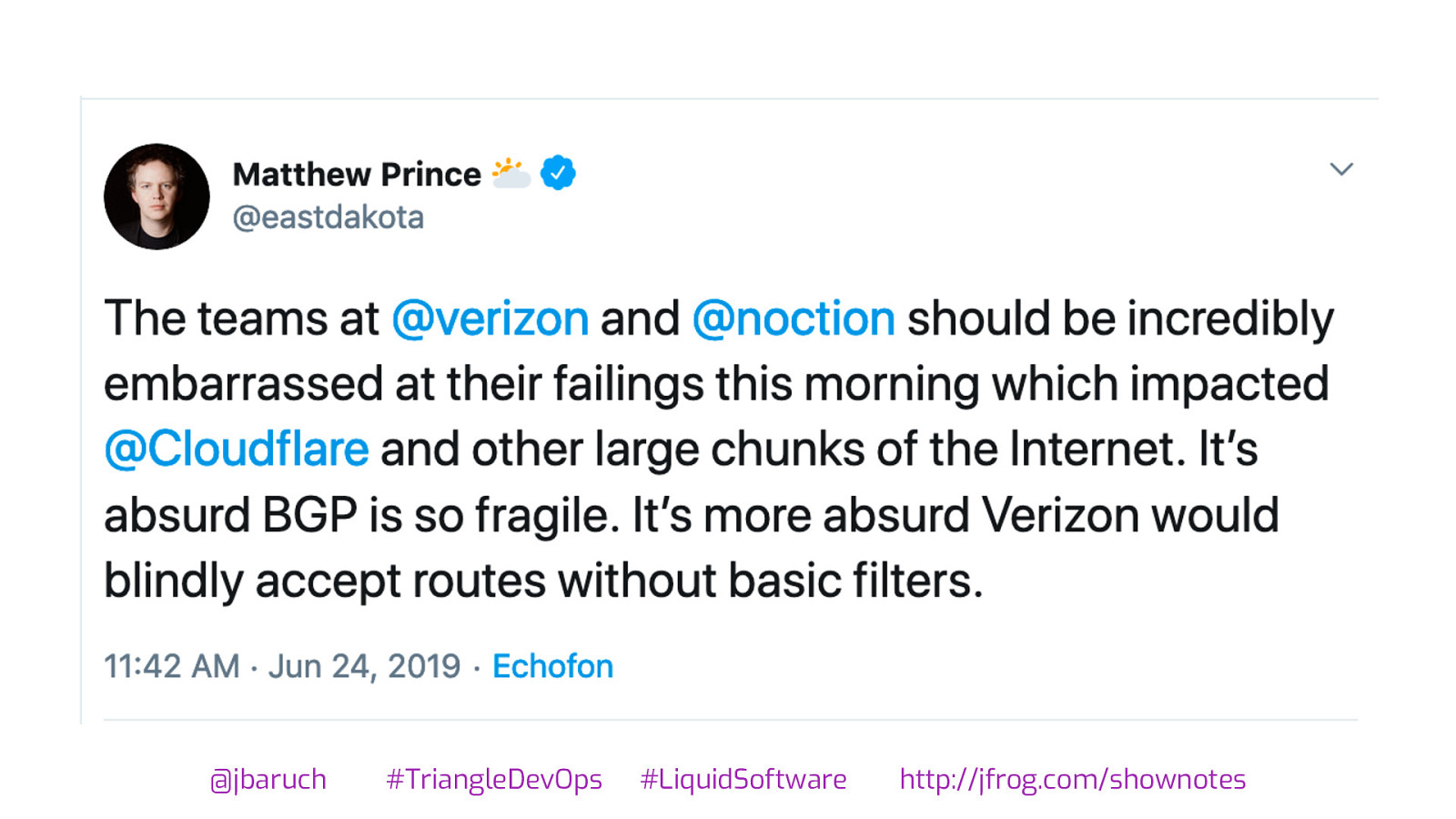
@jbaruch #TriangleDevOps #LiquidSoftware http://jfrog.com/shownotes
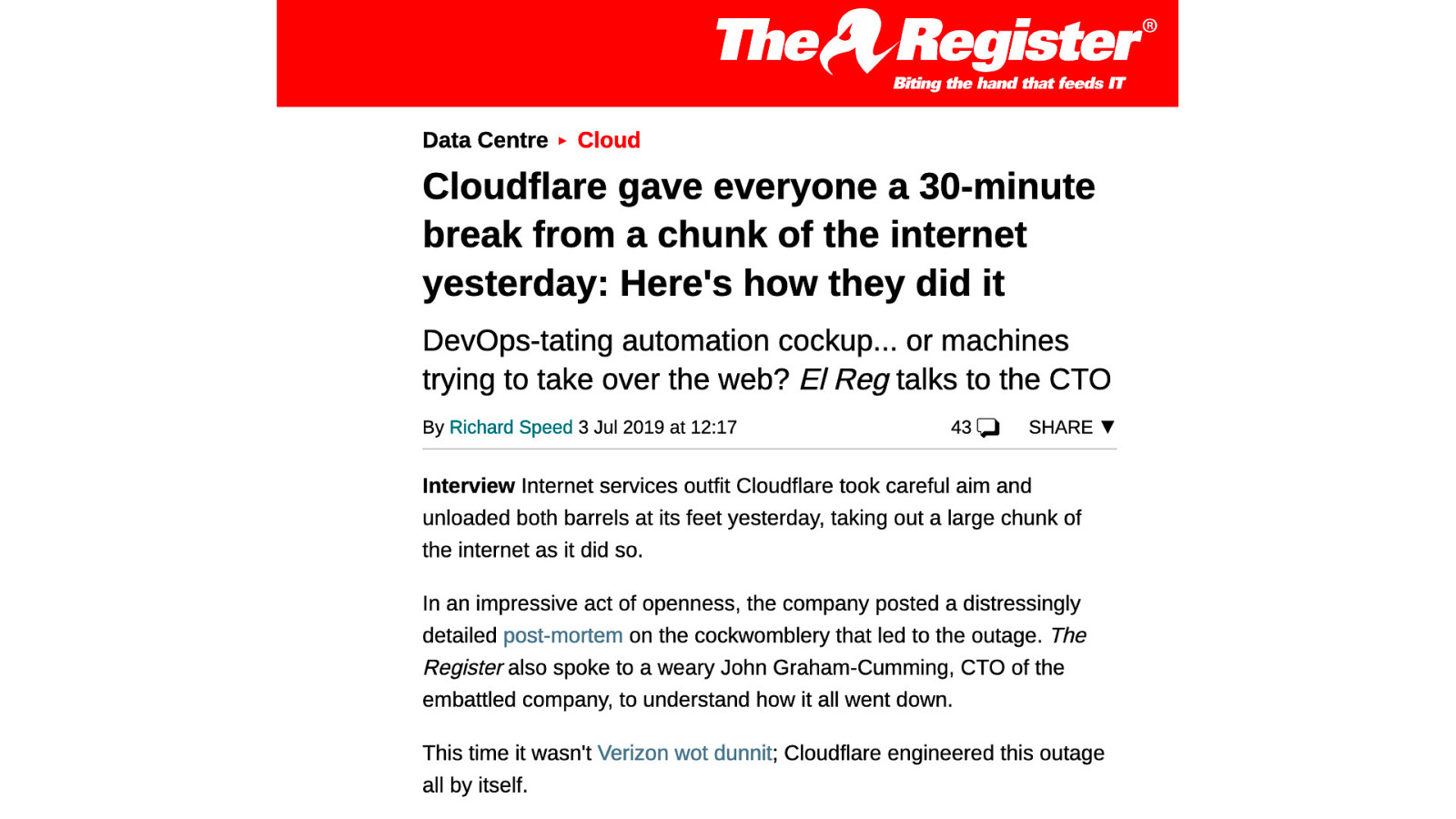
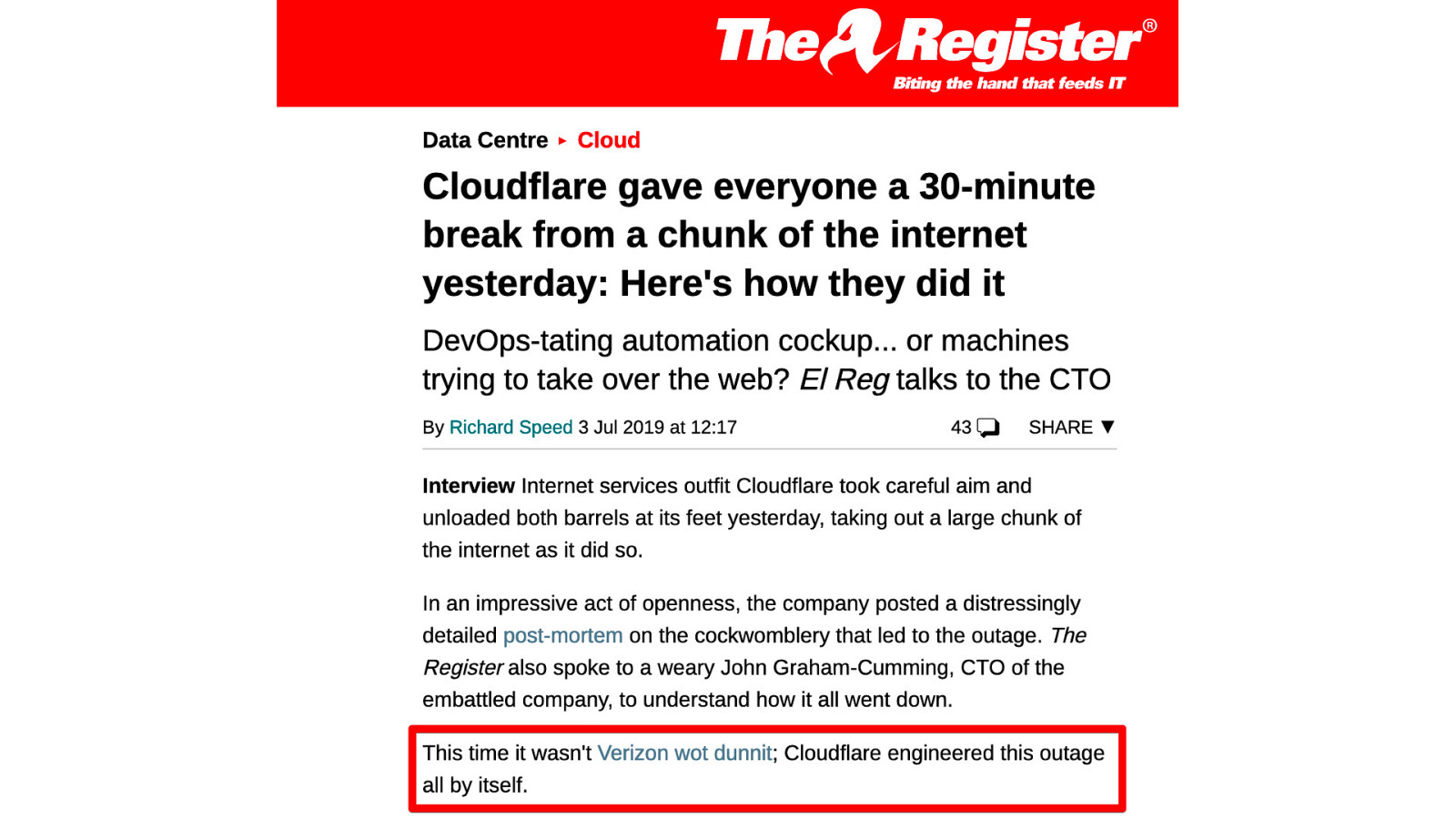
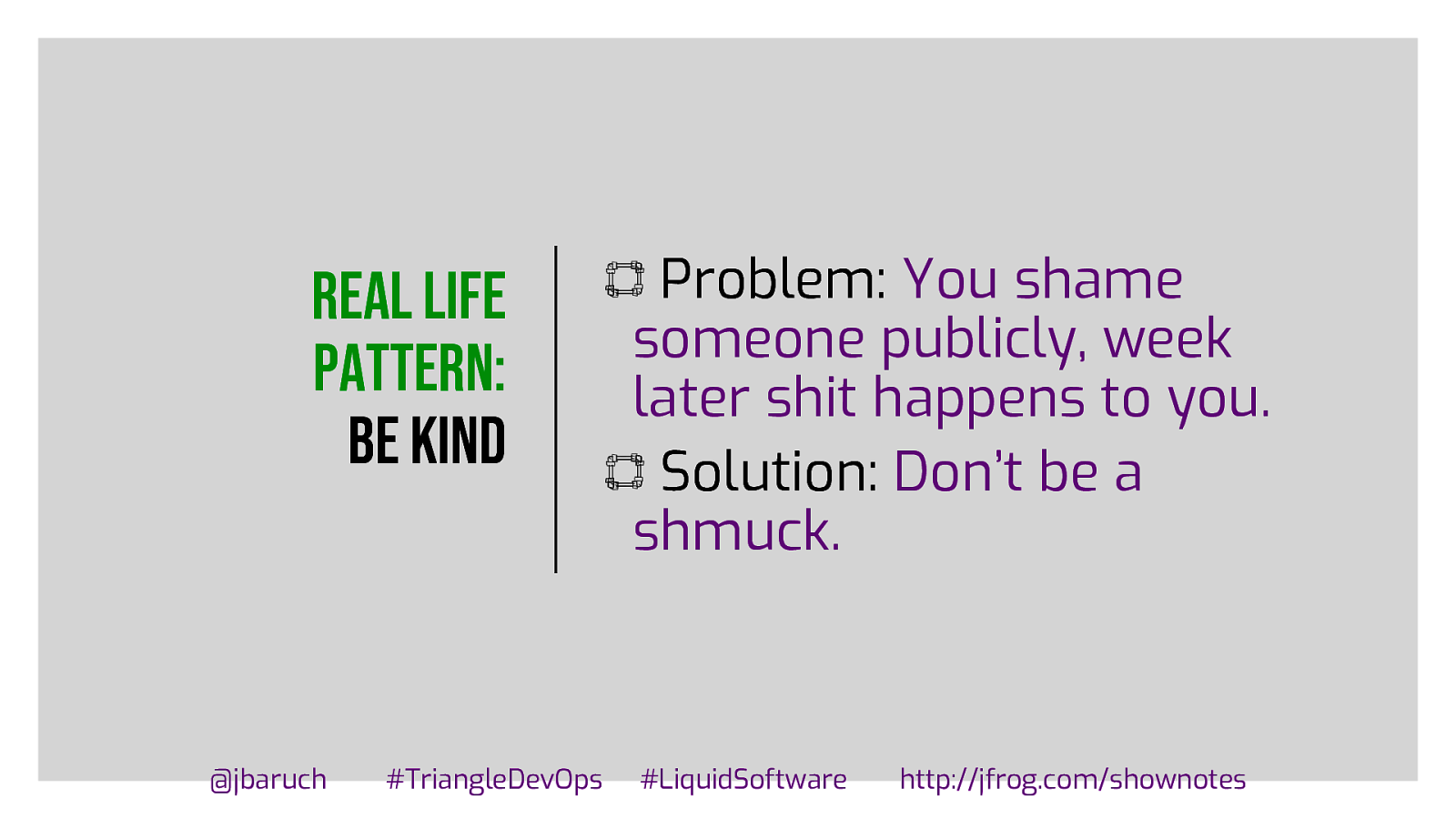
Real life pattern: be kind @jbaruch #TriangleDevOps Problem: You shame someone publicly, week later shit happens to you. Solution: Don’t be a shmuck. #LiquidSoftware http://jfrog.com/shownotes
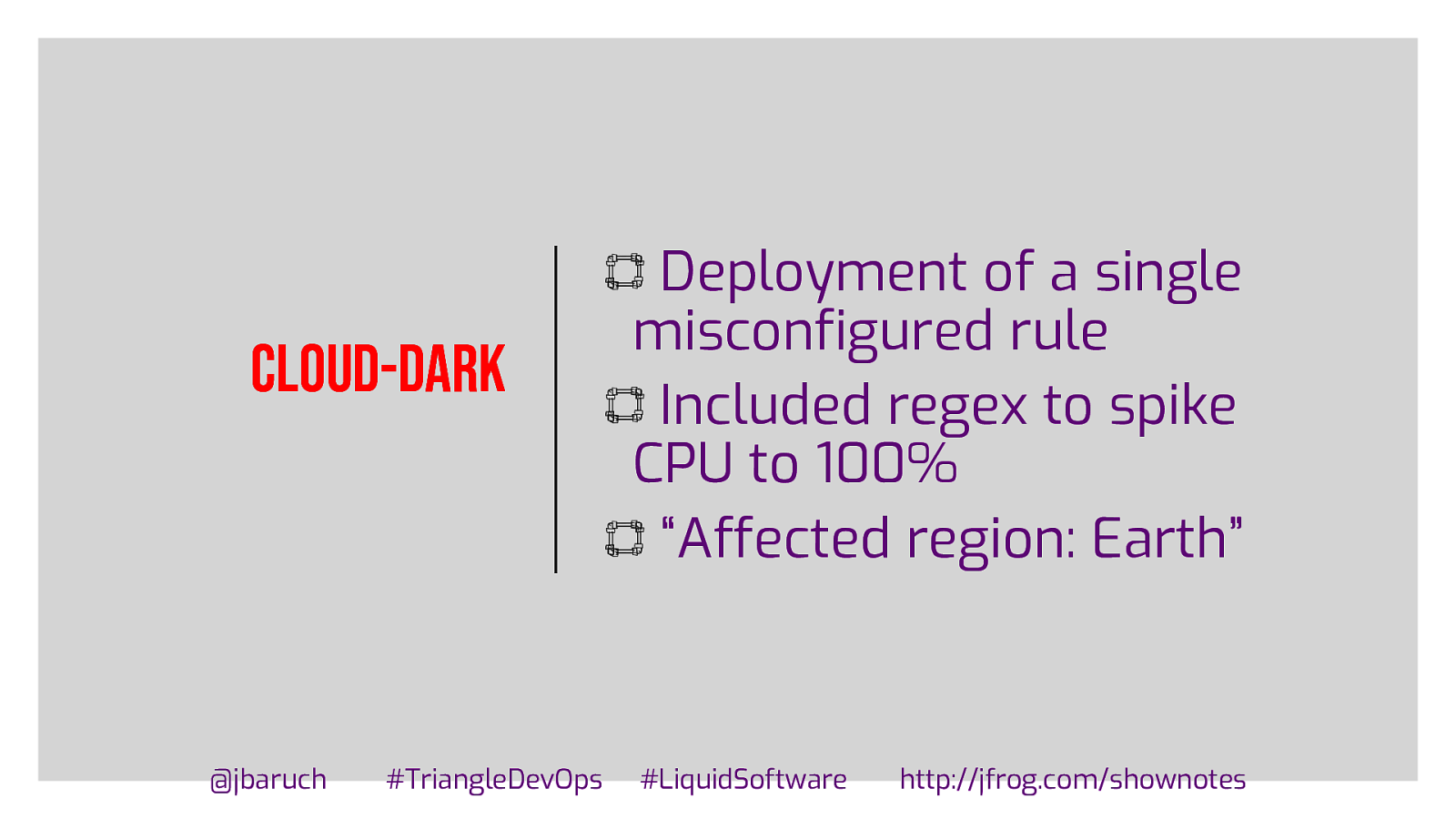
Cloud-dark @jbaruch #TriangleDevOps Deployment of a single misconfigured rule Included regex to spike CPU to 100% “Affected region: Earth” #LiquidSoftware http://jfrog.com/shownotes
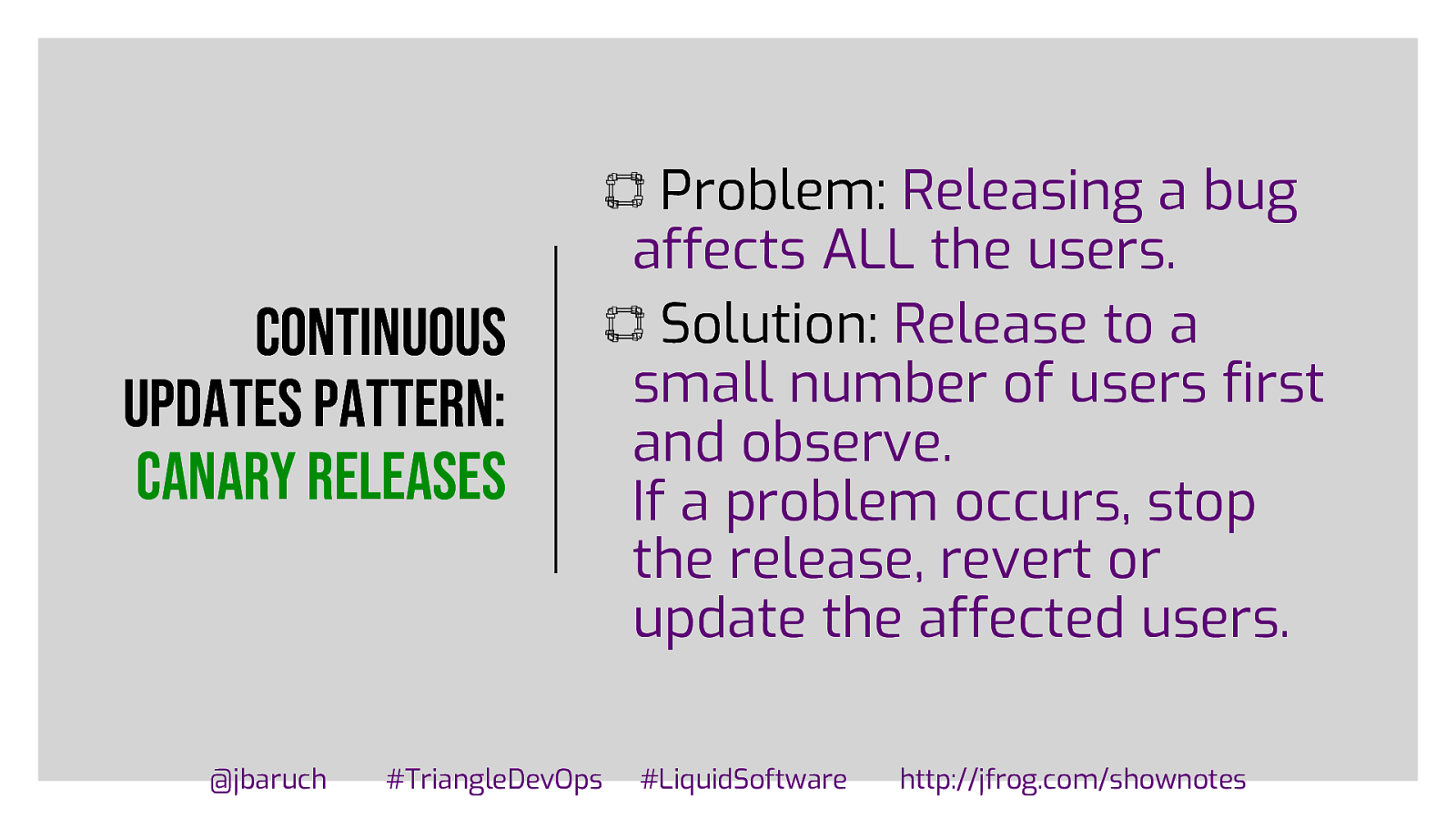
Continuous updates pattern: Canary releases @jbaruch #TriangleDevOps Problem: Releasing a bug affects ALL the users. Solution: Release to a small number of users first and observe. If a problem occurs, stop the release, revert or update the affected users. #LiquidSoftware http://jfrog.com/shownotes
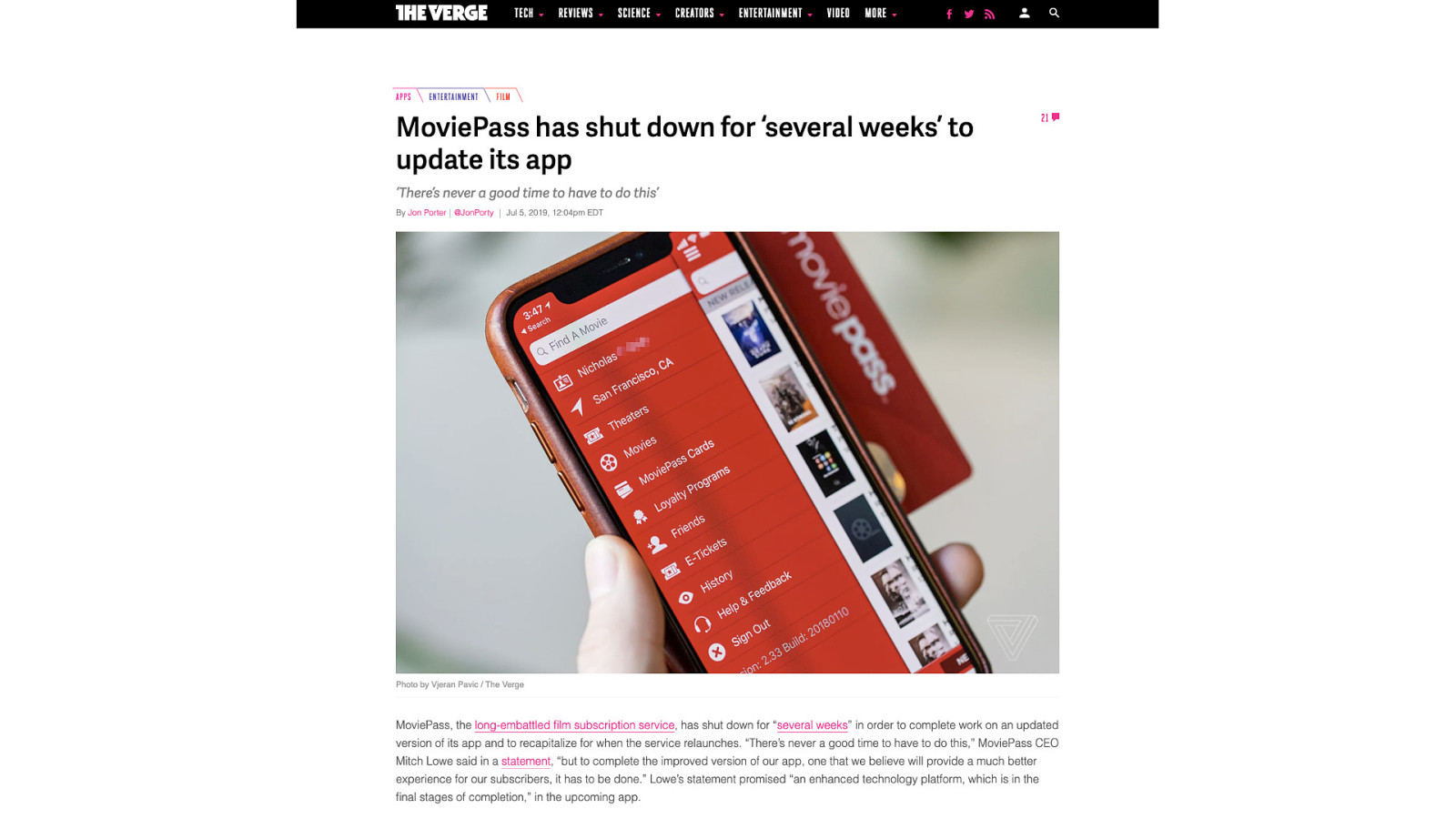
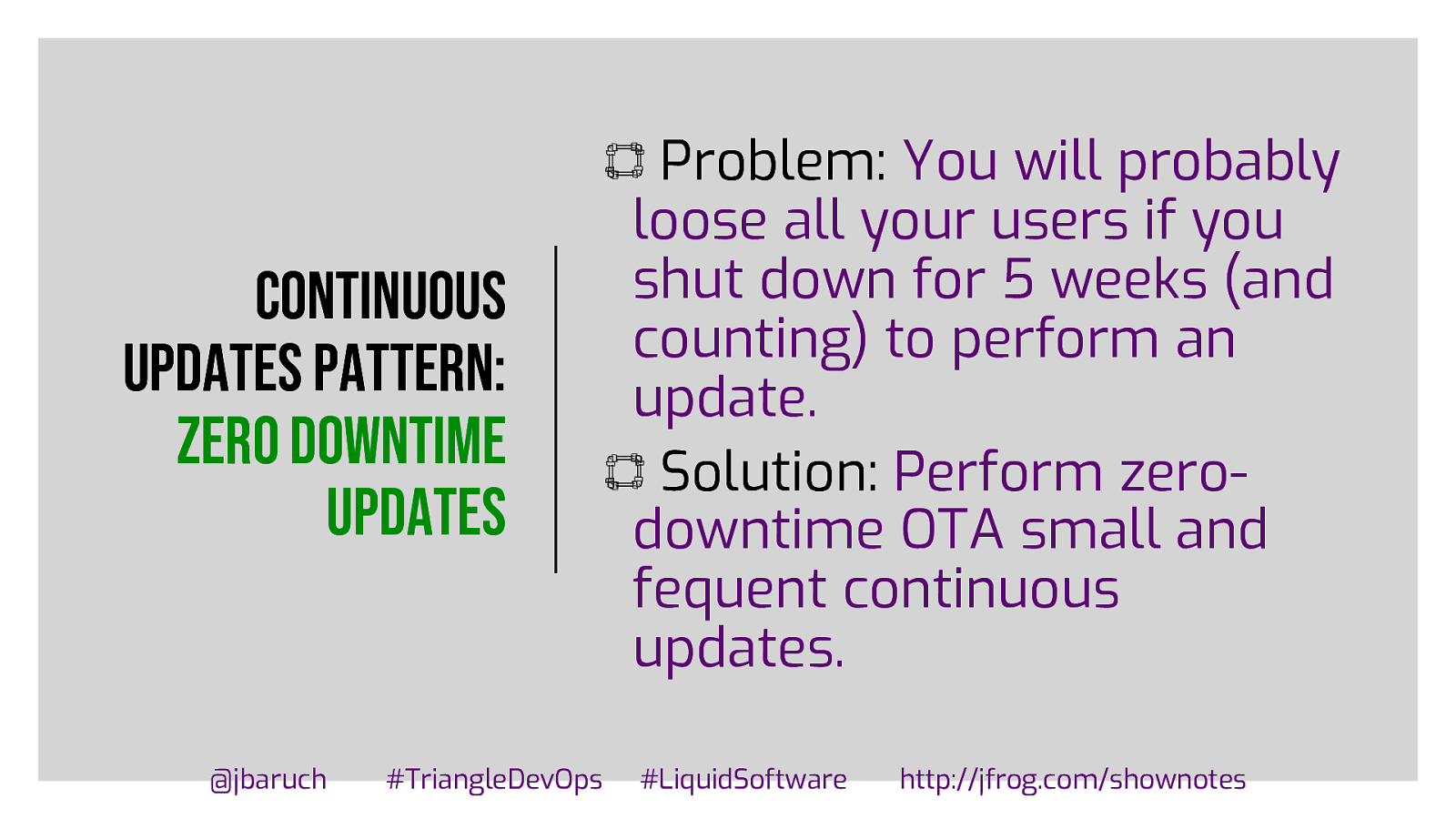
Continuous updates pattern: zero downtime updates @jbaruch #TriangleDevOps Problem: You will probably loose all your users if you shut down for 5 weeks (and counting) to perform an update. Solution: Perform zerodowntime OTA small and fequent continuous updates. #LiquidSoftware http://jfrog.com/shownotes
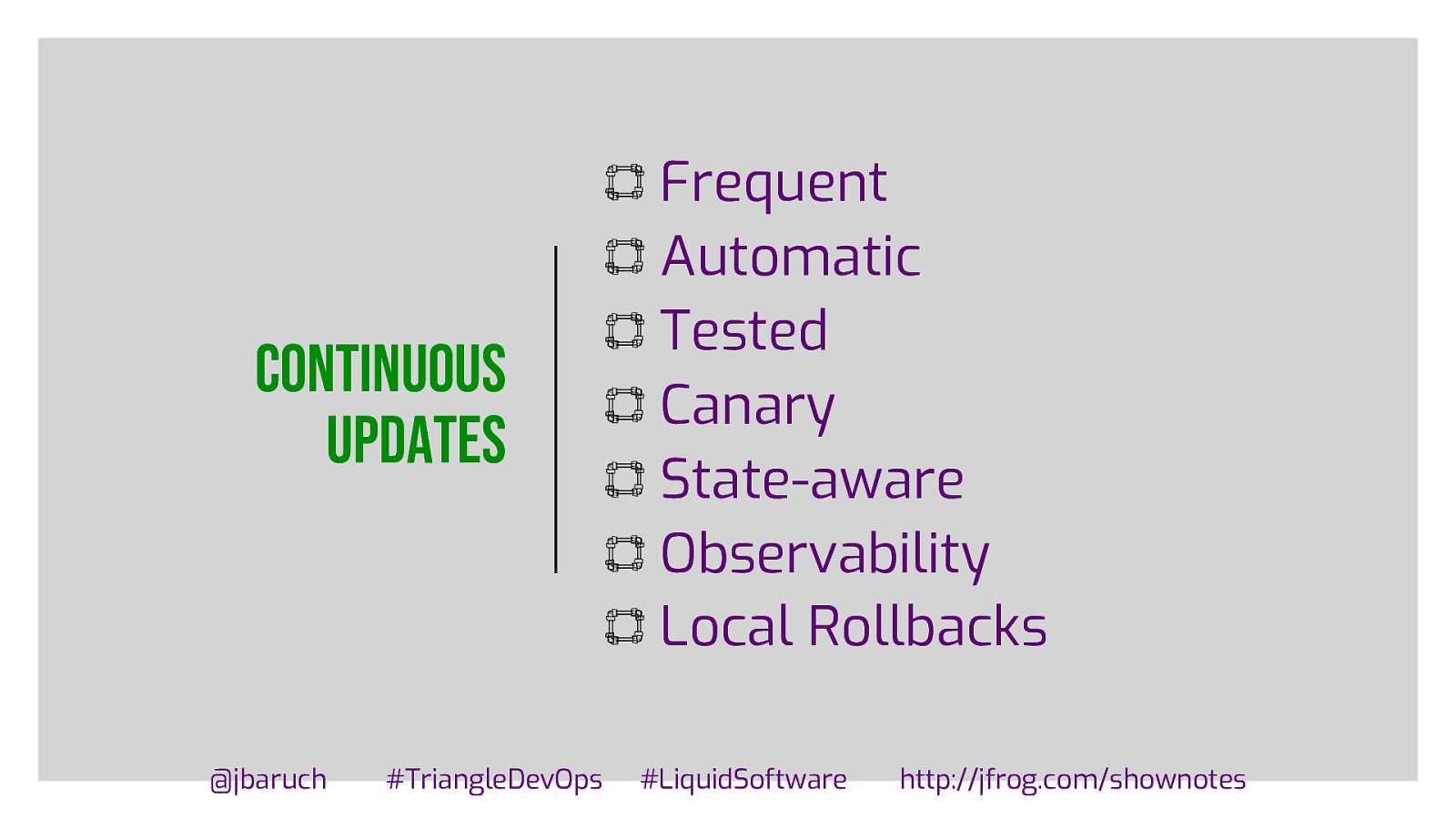
Continuous updates @jbaruch #TriangleDevOps Frequent Automatic Tested Canary State-aware Observability Local Rollbacks #LiquidSoftware http://jfrog.com/shownotes
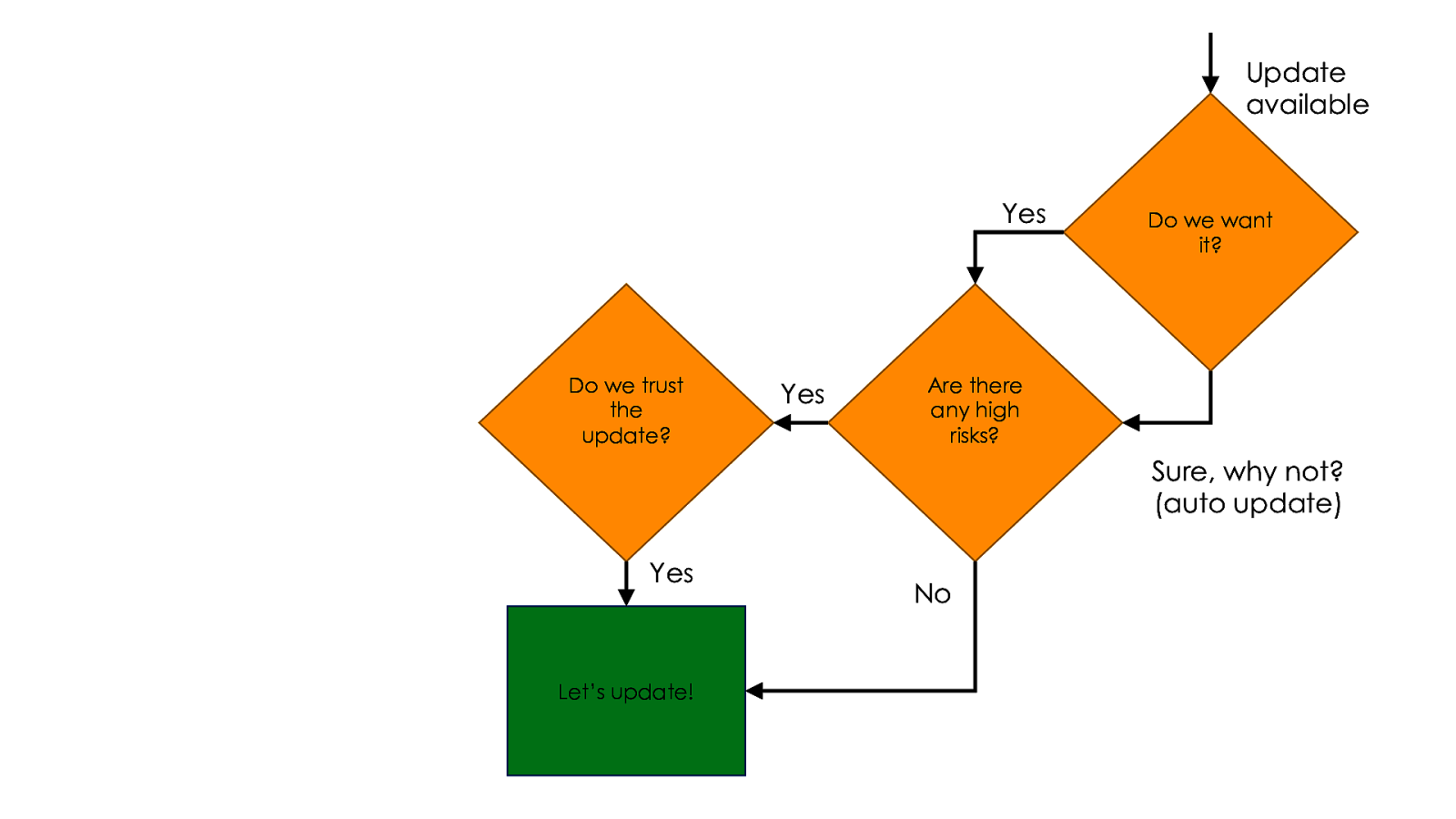
Update available Yes Do we trust the update? Yes Do we want it? Are there any high risks? Sure, why not? (auto update) Yes Let’s update! No
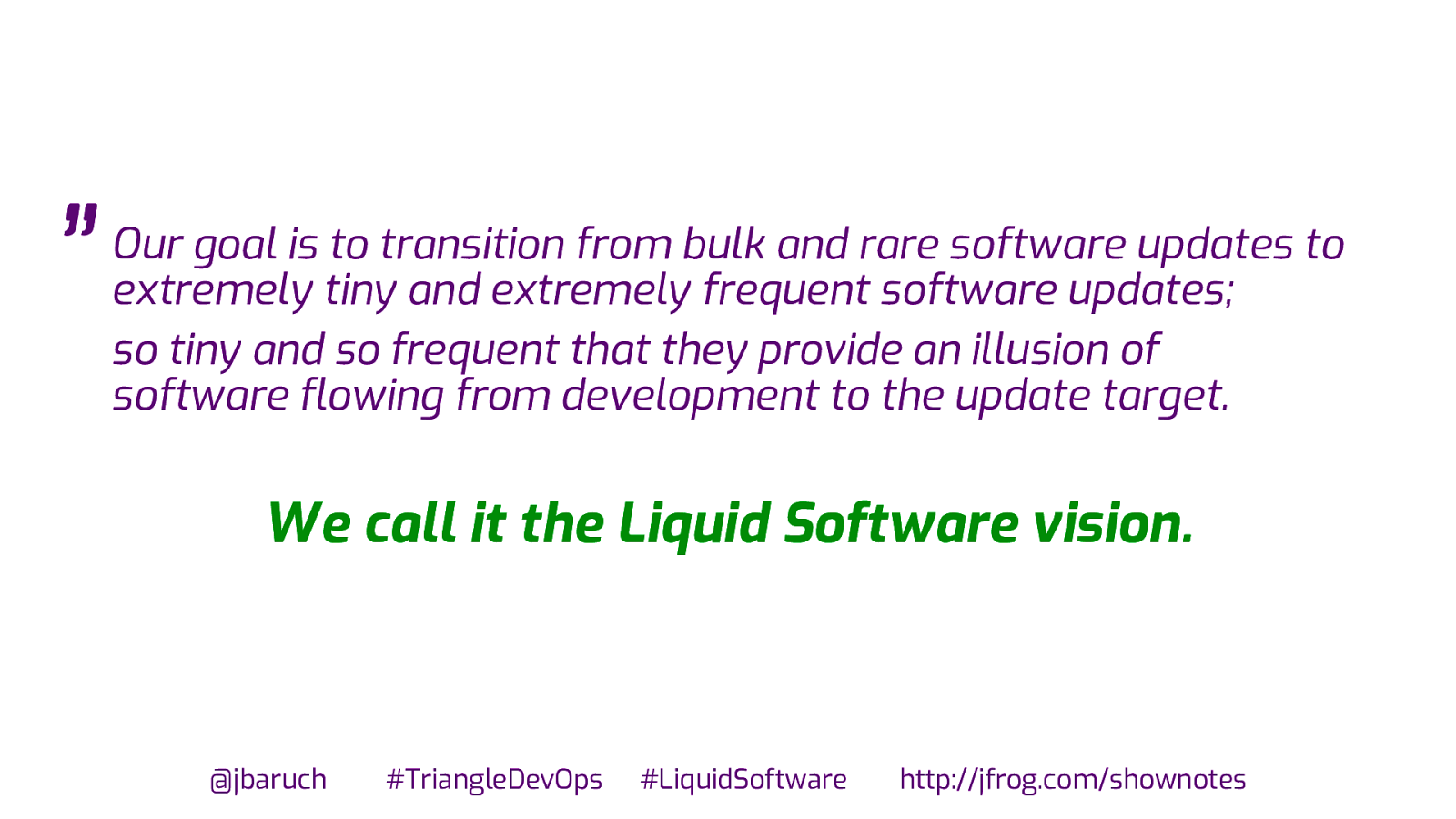
” Our goal is to transition from bulk and rare software updates to extremely tiny and extremely frequent software updates; so tiny and so frequent that they provide an illusion of software flowing from development to the update target. We call it the Liquid Software vision. @jbaruch #TriangleDevOps #LiquidSoftware http://jfrog.com/shownotes
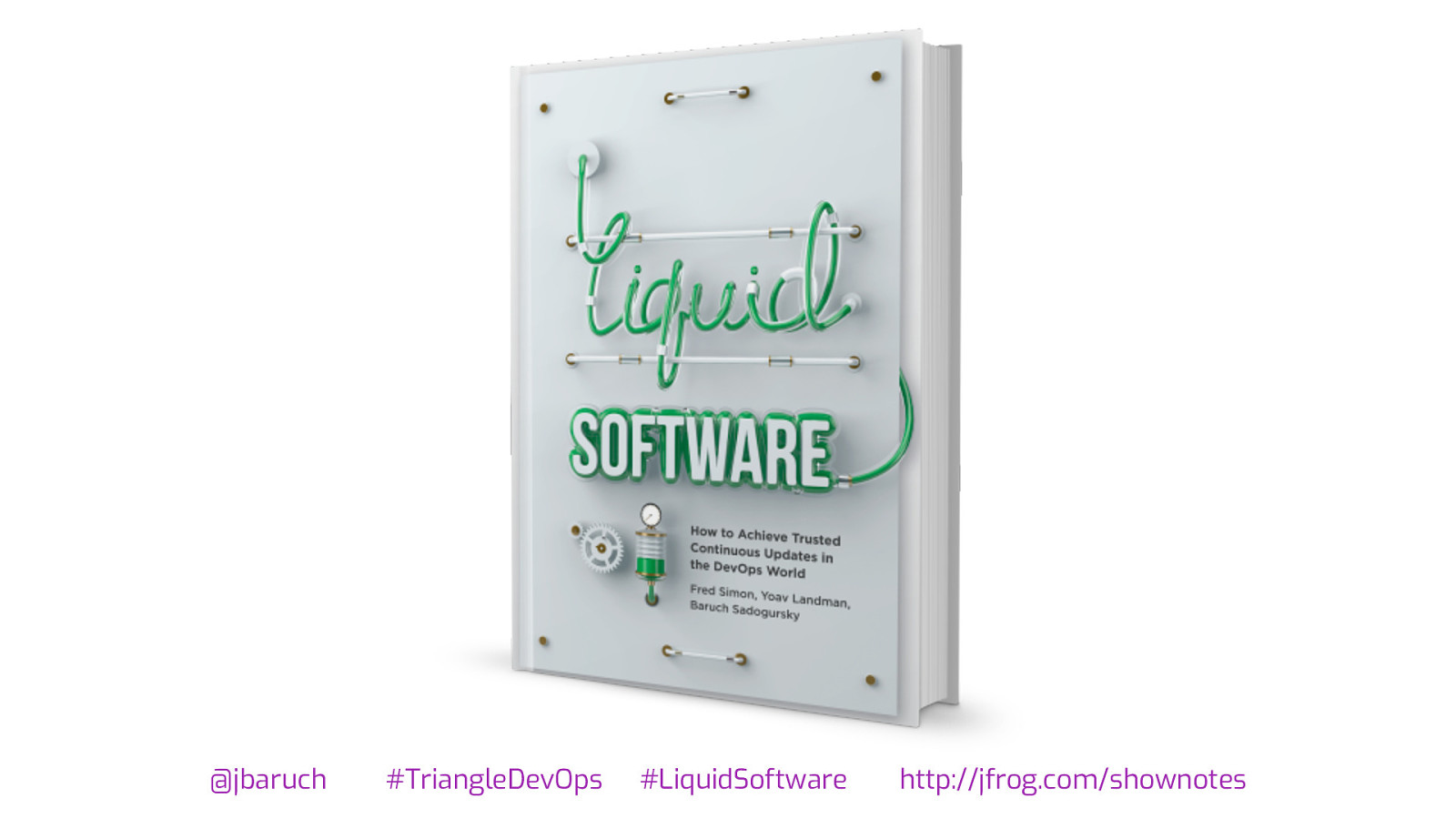
@jbaruch #TriangleDevOps #LiquidSoftware http://jfrog.com/shownotes
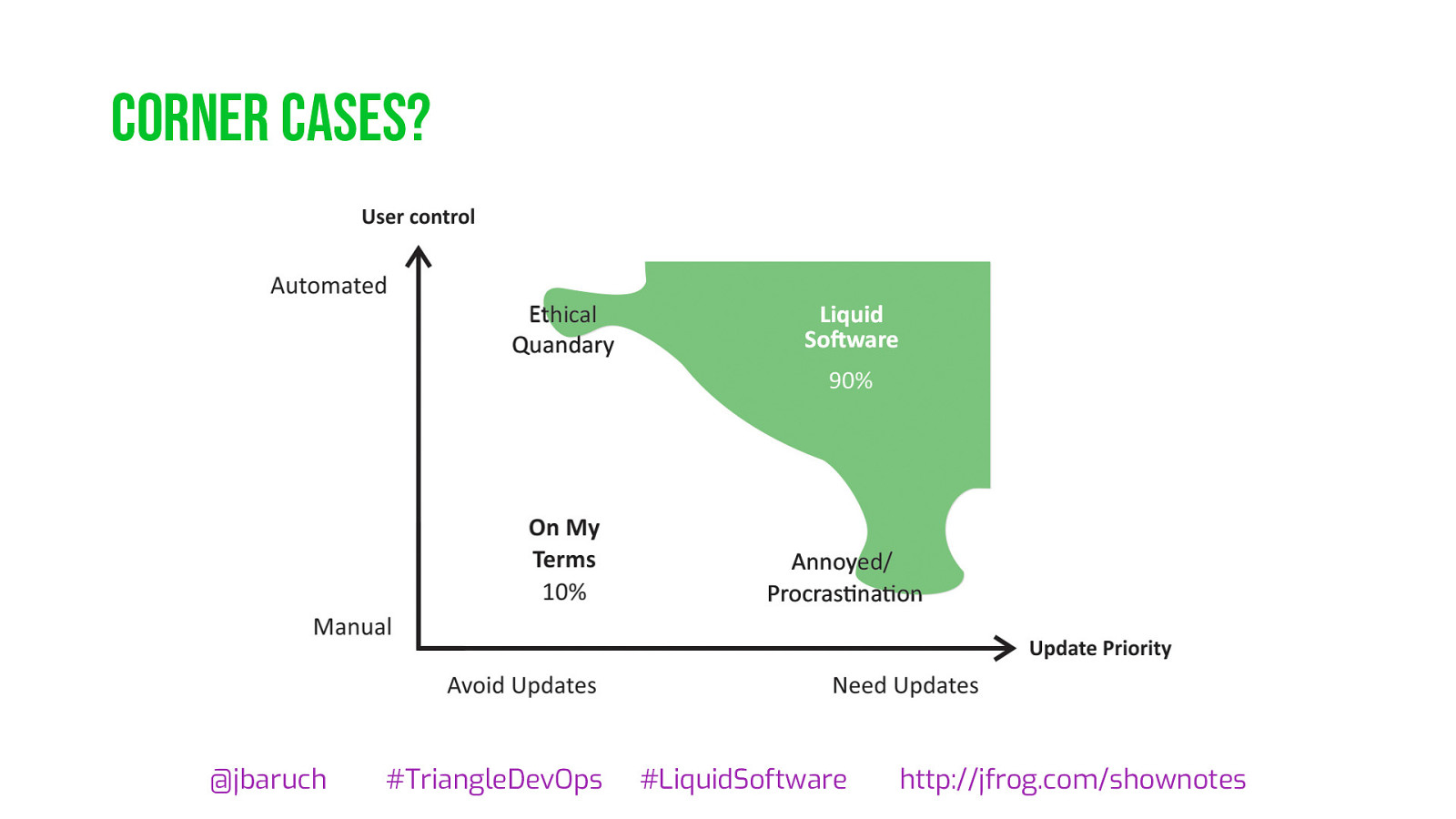
Corner cases? @jbaruch #TriangleDevOps #LiquidSoftware http://jfrog.com/shownotes
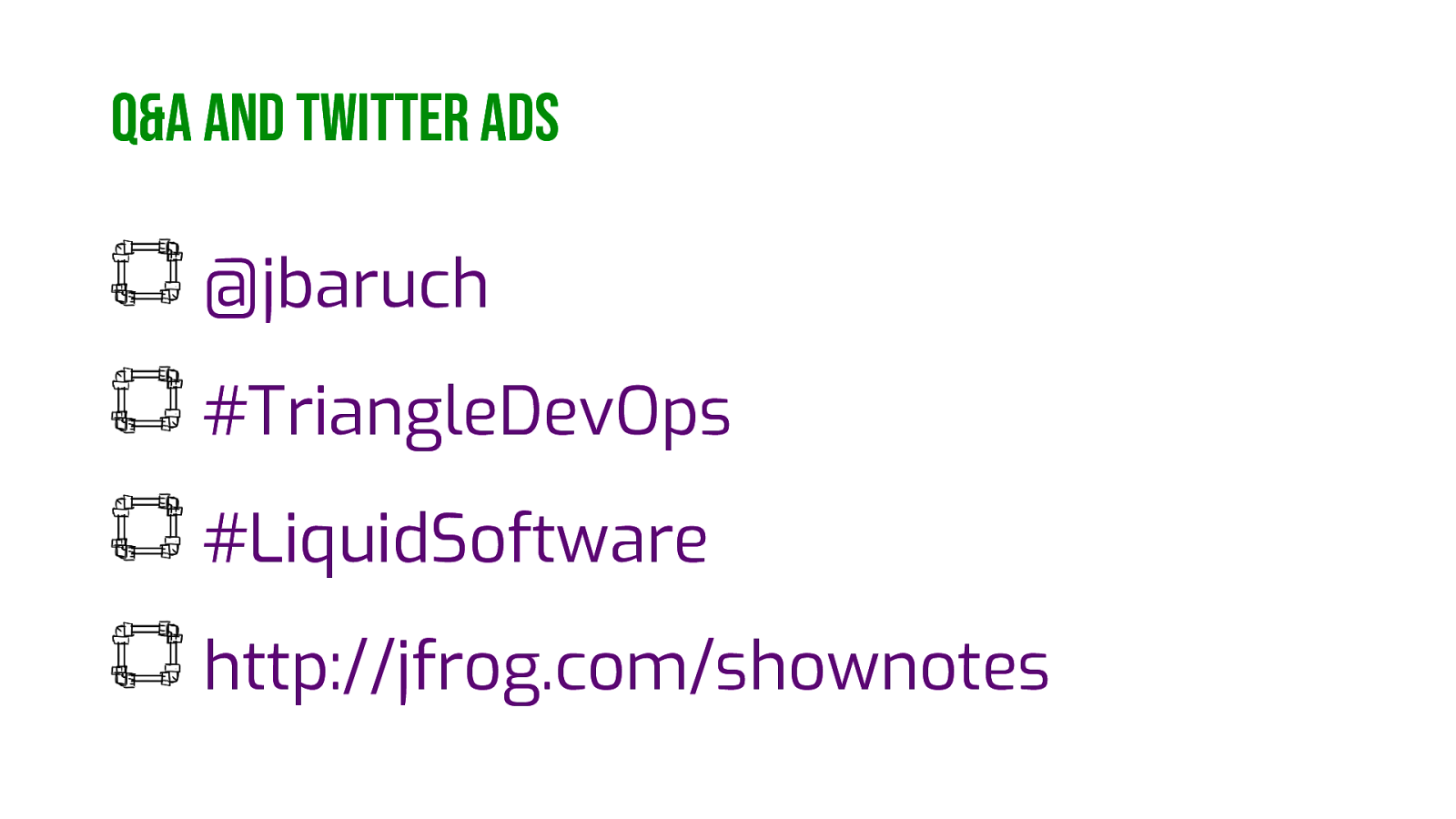
Q&A and twitter ads @jbaruch #TriangleDevOps #LiquidSoftware http://jfrog.com/shownotes
So, you want to update the software for your user, be it the nodes in your K8s cluster, a browser on user’s desktop, an app in user’s smartphone or even a user’s car. What can possibly go wrong?
In this talk, we’ll analyze real-world software update fails and how multiple DevOps patterns, that fit a variety of scenarios, could have saved the developers. Manually making sure that everything works before sending an update and expecting the user to do acceptance tests before they update is most definitely not on the list of such patterns.
Join us for some awesome and scary continuous update horror stories and some obvious (and some not so obvious) proven ideas for improvement and best practices you can start following tomorrow.
